
•


•
•



From

in
Senator Eric Buckson; Adam Blackford, Associate Vice President, Agilent Technologies; Senator Spiros Mantzavinos; Michael J. Quaranta, President, Delaware State Chamber of Commerce


•


•
•



From

in
Senator Eric Buckson; Adam Blackford, Associate Vice President, Agilent Technologies; Senator Spiros Mantzavinos; Michael J. Quaranta, President, Delaware State Chamber of Commerce
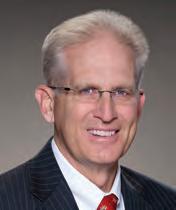
Now that the ink is dry on recent changes to Delaware’s corporate code, a thought or two may be in order. To understand the present, it’s important to reflect on the past. For decades, the Corporate Law section of the State Bar Association would deliberate on proposed changes to Delaware law over weeks, months, and sometimes years before recommending reforms. That section was composed of senior partners from our most influential firms, along with other experienced or mid-career attorneys. Today, for a variety of reasons, those ‘heavy hitters’ are less engaged in the process, presenting both a challenge and an opportunity. This section of the bar is very important to Delaware, and the process must be more deliberative and rely on the luminaries of the bar— those with the experience and perspective to help guide thoughtful, lasting improvements to our corporate laws.
Therefore, in an upcoming issue of this publication, we will be sharing (not endorsing) ideas about how the process used to amend our corporate laws might be better structured. Changes to the law are inevitable, yet part of the Delaware brand has been that changes result from a collaborative, thoughtful, and deliberative process.
It is clear from the comments we heard over the last couple of years that the benefit of more time and more voices might improve the broader acceptance of any proposed changes. The larger business community would welcome this because being asked to endorse changes that are complicated, perhaps controversial, and only tangentially relevant to the thousands of businesses here is an unwelcome position to be in.
Make no mistake, the greater legal community is a substantial and valued part of the Delaware business community. However, it is quite uncomfortable to be pressured to support changes that most people cannot easily describe or relate to at all.
I certainly do not speak for the entirety of the business community, but I do speak for a sizeable portion of it. We are all for Delaware, but that stance has its limits. While the urgency of the situation may have required swift action, we cannot afford to repeat this process if we want well-reasoned, widely accepted legislation in the future.
Marie Holliday, CPA Chair Michael J. Quaranta President Regina Donato Editor Christina Jones Graphic Design
CHAIR
Marie Holliday, CPA
The Bonadio Group
VICE CHAIR
John C. Gooden
M. Davis & Sons, Inc.
Catherine M. Bassett
Mountaire Farms
Andrew Cottone, Ph.D.
ADESIS
Dr. LaVerne T. Harmon Wilmington University
Tom Horne
JPMorgan Chase
Natalie Keefer Bank of America
Michael A. Albero, CPA, MST* AKA Advisory, LLC
Tony Allen, Ph.D.
Delaware State University
Pierre Anderson
Artesian Water Company, Inc.
Steve Baccino
Chesapeake Utilities
Christopher W. Baker
George & Lynch, Inc, Greg Ballance
Diamond Technologies
Scott Baylis WSFS Bank
Mike B. Berardi
Wohlsen Construction Co.
Adam Blackford
Agilent Technologies
Robert A. Book II
Delaware Electric Cooperative
Julian H. “Pete” Booker
Delaware Public Media
Jennifer Gimler Brady
Potter Anderson & Corroon LLP
Dr. Mark T. Brainard
Delaware Technical Community College
Beth G. Brand University of Delaware
Desa Burton
Zip Code Wilmington
Darren Buseman
B&M Meats, Inc.
Robert L. Byrd
ByrdGomes
Patrick Callihan
Tech Impact
Christopher Carroll Comcast
Stuart Comstock-Gay Delaware Community Foundation
Charlie Copeland Associates International, Inc.
Pam Cornforth
Ronald McDonald House Charities of Greater Delaware
Jason Danner
Kelly Benefits Strategies
Rick Deadwyler
Corteva Agriscience™
Ernest Dianastasis The Precisionists, Inc.
Brian DiSabatino
EDiS Company
Walter Donaldson
Freeh Sporkin & Sullivan, LLP
Lisa M. Donlon, PE VanDemark & Lynch
Janet Dougherty
Fulton Bank, N.A.
Thère du Pont Longwood Foundation
Jerry Esposito Espo Enterprises, LLC
John C. Fannin III
Harvey, Hanna & Associates
G. Kevin Fasic, Esq. Offit Kurman
Jennalee Fede, PE Verdantas LLC
Brian Frazee
Delaware Healthcare Association
Donald T. Fulton
Weiner Benefits Group
Martha S. Gilman
Cornell Property Management Corp.
Joseph V. Giordano
Whisman Giordano & Associates, LLC
Terry Glebocki
Delaware Park Casino & Racing
Jason D. Gonzalez DuPont
Logan S. Herring, Sr. The WRK Group
Kirsten Higgins Tidewater Utilities, Inc.
Bayard Hogans
Enstructure Mid-Atlantic
Michael Houghton
Morris, Nichols, Arsht & Tunnell, ret.
Tim Houseal†
Young Conaway Stargatt & Taylor, LLP
Jessica Hunt Siemens-Healthineers
Mark Hutton M&T Bank
LeVar Johnson Novo Nordisk
Robert McGuckin Verizon
Michael A. Meoli The Meoli Companies
Nicholas A. Moriello, RHU Highmark BCBS Delaware
Cathy Kanefsky Food Bank of Delaware
Colleen Perry Keith, Ph.D. Goldey-Beacom College
Melissa Kenny ShopRites of Delaware
Apollo Khine Barclays US Consumer Bank
Matthew Lantagne
TD Bank
Rodger Levenson WSFS Bank
Alan Levin SoDel Concepts
Andy Lubin
Delaware Financial Group
Mac Macleod Carvertise
Scott Malfitano CSC
William E. Manning Saul Ewing LLP
Mark R. Marcantano, JD Nemours Children’s Health, Delaware Valley
Paul M. McConnell McConnell Development, Inc.
Katie McEvoy AT&T Delaware
Gregory Miraglia PNC Bank
Jeff Mitchell Siegfried Advisory
Jonathan D. Moll, CPA Belfint, Lyons & Shuman
Chad Moore Beacon Hospitality
Terry Murphy Bayhealth Medical Center
Janice Nevin, M.D., MPH ChristianaCare
Chris O’Neill PSCI
Jed Patterson LabWare
Chris Perdue Perdue Farms
Robert W. Perkins Brandywine Public Strategies
Chip Rankin MilliCare
Michael Ratchford W. L. Gore & Associates, Inc.
Greg Smith The Chemours Company
David A. Tam, MD, MBA, CPHE, FACHE Beebe Healthcare
Bridget Therriault
AstraZeneca
Ann B. Wayne SUN Behavioral Delaware
Dr. Rob Rescigno Collaborative Consulting LLC
Lloyd A. Ricketts Wilmington University
Robert “Rob” Rider, Jr. O.A. Newton
Bettina Tweardy Riveros ChristianaCare
Salvatore J. “Chip” Rossi Bank of America
James J. Roszkowski Discover Bank
Jake Ruddy PCS
Rhett Ruggerio Ruggerio Willson Watson
Dennis M. Salter
Edinburgh Capital Management LLC
Greg Sawka Bancroft Construction Company
Chris Schell Schell Brothers
Robert S. Smith Santora CPA Group
Jonathan Starkey Delaware State University
Mark Stellini Assurance Media
Mike Tatoian
Dover Motor Speedway
Jim Taylor Saul Ewing LLP
Ivan Thomas DETV
Jana Tidwell AAA Club Alliance
Michael S. Uffner AutoTeam Delaware
Mike Vanderslice Environmental Alliance, Inc.
Phillip J. Vavala Delmarva Power
Rod Ward CSC
Robert W. Whetzel Richards, Layton & Finger
Ed Winslow Citizens Bank
Kevin M. Wolfgang Evergreen Apartment Group
*Treasurer †Counsel Michael
Damon Howard
Tyler
Helana Rodriguez Director, The Partnership
Amanda Schimmel
Manager, Marketing & Accounting
Kerri Welcher
Manager, Events
BY TYLER MICIK
AS THE GENERAL ASSEMBLY continues its 153rd session, the State Chamber remains actively engaged on several issues that could have significant implications for Delaware’s business community. From pay transparency to updates to Delaware’s corporate law, the diversity of proposed legislation reflects the evolving challenges facing our members.
In March, Governor Meyer presented his FY 2026 budget reset—totaling over $6.58 billion, which is about a 7.4% increase over this year’s budget, while the state’s revenue is only expected to grow by 1.9%. To help close this gap, the budget calls for the creation of three new personal income tax brackets for those who make $125,000; $250,000; and $500,000, along with raising the cigarette tax by 50 cents. That said, expenses are outpacing revenues, and determining what gets funded—and what doesn’t— will require making some hard decisions.
There are several bills the State Chamber is particularly engaged on that recently passed or are making their way through the legislative process.
Senate Substitute 1 for Senate Bill 21 was passed by the General Assembly and signed into law by Governor Meyer in late March. The bill amends Delaware’s corporate law by providing clearer frameworks for transactions involving interested parties and refining stockholder rights to provide legal clarity and predictability for corporations—essential qualities in maintaining Delaware’s status as the nation’s preferred place of incorporation. The State Chamber has always been committed to supporting policies that are in the best interest of our state, and this is no exception. That said, the State’s reliance on substantial sums of money coming from outside its borders to fuel government spending demonstrates the need for pro-growth policies and the diversification of its economy.
enforcement authority and imposes penalties for violations.
While we support the goals of pay transparency and equity, the bill’s strict compliance requirements, potential for costly penalties, and administrative burden pose challenges for employers, especially small businesses. Additionally, wage ranges can vary based on market demand, candidate experience, and other dynamic factors. Requiring rigid disclosures risks reducing flexibility in hiring and may unintentionally deter some businesses from expanding or posting new roles.
For example, in states where pay transparency laws are already in effect, a common concern among employers is that once salary ranges are posted, current employees may expect to be paid at the top of the range, leading to internal dissatisfaction and tension. These postings could also encourage more job shopping and higher employee turnover, potentially driving wage inflation and putting small businesses at risk of closure.

Other bills we are following include Senate Bill 63, general contractor liability; House Bill 84, employer-sponsored meetings and communications; House Substitute 1 for House Bill 13, personal income tax changes; Senate Bill 89, credit card transactions; House Bill 111, single-use food service items; House Bill 115, discrimination based on weight, height or body size; and a draft chatbot disclosure bill.
The State Chamber remains committed to advocating for our members and will continue to work on these bills through June 30. To stay informed, we hope you will consider joining one of the State Chamber’s policy committees and attending our Small Business Day in Dover on May 15 or End-of-Session Policy Conference on May 21. For more information, please contact me at tmicik@dscc.com.
House Bill 105, pay transparency, is another bill that our members have expressed concerns over. The bill requires businesses with 11 or more employees to post salary or wage ranges in all job advertisements, both internally and externally, and to maintain detailed records of job descriptions and compensation histories for each employee. It also grants the Delaware Department of Labor


BY MARCUS BEAL
DELMARVA POWER, Delaware’s largest utility, is dedicated to providing reliable energy and ensuring grid stability for residents. However, rising energy demand is outpacing supply, driving up costs for customers. Addressing this challenge requires collaboration with federal, state, and local governments, as well as other utilities. Like many states, Delaware faces challenges with aging infrastructure, climate change, and growing energy demand, and must find solutions to ensure reliable and affordable energy.
Delmarva Power is committed to supporting our customers, including implementing expanded payment programs during the winter and offering budget billing options while also connecting customers with energy assistance. Additionally, energy efficiency programs such as the Whole Home Program offer customers ways to save energy and money. We have also proposed a Winter Normalization Adjustment (WNA) to help stabilize natural gas bills during the winter heating season, protecting customers from weather-related fluctuations.
While Delmarva Power shares the State’s concerns, we believe proposed legislation, including Senate Bills 59, 60 and 61, does not adequately address the root cause of rising energy costs—energy supply.
The majority of Delaware’s energy is purchased through the PJM capacity auction, where prices are driven by supply and demand. As demand continues to grow and usage increases, it’s becoming more difficult for supply to keep pace. To ensure grid reliability, Delaware
must invest in a balanced mix of renewable and dispatchable energy sources, including natural gas.
Senate Bill 60 proposes a cap on investments, which could hinder efforts to maintain reliable service. Over the past decade, Delmarva Power has reduced electrical outages by 47% and natural gas interruptions by 48%, and capping reliability investments would jeopardize these improvements.
Senate Bill 61, which calls for public votes at PJM, is unnecessary, as these votes are already publicly available after the final tally. The bill has no impact on customers’ bills and fails to address the underlying energy supply issue.
Delaware’s energy challenges highlight the need for constructive dialogue and action to increase in-state generation. As an energy importer, Delaware faces a major disadvantage. Delmarva Power is committed to working with elected officials, regulators, and stakeholders to develop long-term solutions that meet the state’s energy needs while keeping costs manageable for all customers. n

Marcus Beal is the regional vice president of external affairs at Delmarva Power.
BY STEPHANIE HANSEN, ESQ.
THIS PAST WINTER, many Delmarva Power ratepayers were surprised by electric and gas bills that far exceeded their expectations and their previous monthly bills. Town halls were packed with hundreds of angry ratepayers demanding answers about their specific bills, how the situation arose, and how it will be addressed.
In mid-February, I called a special Senate Environment, Energy and Transportation Committee meeting, where Delmarva Power presented information explaining what they viewed as the cause of the increase, largely colder-than-expected temperatures.
It’s true that it was colder than last year, but there was more to the story. Delmarva Power’s frequent rate increases, granted by the Public Service Commission (PSC) over the past 12 years, continually drove up the prices that ratepayers paid for gas and electricity, as well as the delivery of both.
Discussions with the executive director of the PSC and current and former public advocates revealed that they have felt hamstrung for many years by the current review standard that the PSC is bound by in a rate case.
Regulated utilities like Delmarva Power recover their operational and capital expenses by applying to the PSC and requesting that recovery. The PSC reviews those expenses under the business judgment rule and, as long as the expenses are not the result of waste, bad faith, or abuse of discretion, recovery is allowed.
This has been the rule in Delaware for a long time, but Delaware is one of only two states in the country that still use the business judgment rule. All other states use the prudence rule, which is less deferential to the utility. The prudence rule evaluates the objective reasonableness of the expenditure based on what the utility knew or should have known at the time the expenditure was made and asks whether the expense was prudently incurred.
Other states made this switch in recognition that regulated utilities are generally monopolies that serve a particular area, and customers are captive. Unlike in a competitive market, customers are not free to take their business elsewhere when the service becomes too expensive. The prudence rule provides balance and a check on utility spending, and Senate Bill 59 enacts the prudence rule in Delaware.
Senate Bills 59 and 60 are complementary pieces of legislation in the same process—the recovery of money by the utility during the PSC’s rate-making process. However, while Senate Bill 59 addresses the

standard of review the PSC will use for the recovery of money already spent by the utility, Senate Bill 60 sets ground rules for what expenses are recoverable at the onset.
Under Senate Bill 60, certain expenses are no longer recoverable, including lobbying activities, political contributions, membership dues used for lobbying, charitable contributions, and certain advertising and public relations activities.
Additionally, Senate Bill 60 puts in place a cost cap of $125 million on capital expenses for Delmarva Power from 2026 to 2028, with exceptions for emergencies or extraordinary circumstances. This amount was determined by the expert hired by the PSC and the public advocate to review Delmarva Power’s rolling three-year Infrastructure, Safety and Reliability (ISR) Plan, with an escalator to account for inflation and increased labor and material costs.
Lastly, Senate Bill 61 focuses on bringing transparency to PJM decision-making. PJM is our regional grid operator, and its decisions affect what generation and transmission gets built in Delaware, the reliability of our electric grid, and the wholesale price of electricity. Currently, the votes cast by Delmarva Power at PJM stakeholder meetings are not public. Senate Bill 61 would change that. n





››Growing older doesn’t have to come at the cost of leaving your home. Serving families of Delaware from Wilmington to Ocean View, Tailored Care LLC delivers personalized in-home health care driven by a commitment to quality CARE through Compassion, Accountability, Respect, and Excellence. By creating a partnership with customers at every step to coordinate and identify the strategy that best serves their unique needs, Tailored Care LLC ensures family members can continue living on their own and spend time with their loved ones.
Founded in 2020 during the height of the COVID-19 pandemic, Tailored Care LLC began when its CEO and founder, Tabitha Cephas, identified a need in Delaware communities. “I realized that because of the pandemic, families were unable to spend time with their loved ones in care,” explains Cephas. “I had already established my licensing and business, but took the real step forward when I understood how I could touch the lives of others by helping loved ones stay at home with their families.”
With more than 20 years of experience as a registered nurse leader and health care executive, Cephas was wellprepared to lead her first business providing care. Just a couple of years after its establishment, her dedicated team quadrupled from five members to 20. Today, she leads Tailored Care LLC with more than 100 health care professionals sharing the same vision of high-quality, patient-centered care.
BY COLIN HEFFINGER

In honor of the brand name, Tailored Care LLC stands out by tailoring its services to each family. Employees are matched with a consumer based on interests and broad career experiences across social work, nursing, accounting, engineering, and a variety of other fields to create a meaningful connection. From there, employees can provide different levels of support with daily activities, transportation, and companionship to best fit each family’s needs.
The other side of Tabitha’s vision is to create a positive impact on her employees’ lives by developing a culture that regularly supports and empowers them. Staff members are provided with education and mentorship, as well as opportunities to involve their own families through seasonal events. Additionally,
by matching employees with the families they relate to most, Tailored Care LLC strengthens their career impact as they support their communities.
“I’ve been in Delaware since I was five years old,” Cephas reflects on the topic of starting and operating her business in Delaware. “I’m thankful that our state is incredibly welcoming for small businesses to easily reach out and acquire the support they need. Why relocate and serve other areas when I can give back to the people I’ve known and worked with in our local communities? Why not instill something different by supporting the people right here in our backyard?
I’m enthusiastic about continuing to network and partner with local businesses as we work together to advocate for the First State.”

››It all starts with a single spark. From that moment a thought erupts, expanding and dispersing like wildfire, until it forges creativity, passion, and a growing hunger for knowledge. Whether working in health research, protecting the environment, or exploring how the universe works, anyone who has shaped a career in math and science speaks fondly of the moment that brought their career vision to life. For the Delaware Foundation for Science and Mathematics Education (DFSME), nurturing that first spark for upcoming generations is key to ensuring the STEM pipeline can meet the evolving needs of the First State.
Now celebrating its 30th anniversary, DFSME found its own spark when leaders from Delaware’s business, education, and legislative communities united with a commitment to a high-standard education process within public school systems. DFSME emerged from this initia-
tive to guide impactful reform in science and math education for students from preschool through higher education.
“We identify, advocate for, and tackle gaps within the education system,” said Randolph Guschl, executive director of DFSME. “By doing this, we envision our STEM education system as a powerful tool to attract businesses, families, and innovative educators to Delaware.”
“Our largest focus is on STEM educators—continuing to recruit and retain teachers,” added Michelle Kutch, vice president of the DFSME board. “We do this through professional development, awards, grants, events, and other meaningful resources. How a teacher feels in the classroom is our top recruitment strategy.”
Supporting STEM educators goes beyond the traditional classroom. DFSME’s awards and grants recognize after-school teachers and other educators within communities. Their events
BY COLIN HEFFINGER
take it a step further by bringing together business leaders and students to create new connections and reinforce the value educators provide in strengthening the STEM pipeline. Even so, DFSME faces a growing challenge: declining science instruction time in public schools.
“Due to the pandemic and shifts in society, the amount of time students spend on science has fallen dramatically,” said Anne Pfaelzer de Ortiz, director of development and operations.
“Schools are measured for success by certain factors, and those typically focus on reading and math rates. To make matters worse, students have fewer opportunities to see if a field in science is a good fit. Despite this, science skills are essential in daily life, and it’s critical that children develop them at an early age—especially in today’s technologydriven world.”
“Providing opportunities for that spark in science to be nurtured through inno-

BY TYLER MICIK
››The State Chamber’s Small Business Alliance (SBA) held its quarterly meeting in April. The SBA serves Delaware’s small business community—which makes up more than 80% of our membership—by helping them grow and thrive through collaborative networking, idea sharing, and identifying solutions to the challenges they experience. The SBA advocates for policies that support new and existing small businesses in a dynamic economy, safeguarding their long-term competitiveness and the retention of jobs.

vative teachers and engaging curricula is key,” stated Guschl. “This is why we encourage, for example, finance companies to realize their connection to STEM. Each of these businesses can make a difference by supporting DFSME or volunteering to teach current students.”
Considering Delaware’s business needs for a strong STEM pipeline, Pfaelzer de Ortiz pointed back to the nonprofit’s roots in passion and collaboration. “As a team, we believe in what we do, and we’re passionate that it’s the most important thing we can do,” she reflected. “Looking forward, nonprofits can do more by creating partnerships and sharing resources for a common cause. This is how we will all truly grow and make the most meaningful impact throughout Delaware.”
Business leaders can explore DFSME and upcoming events at www.dfsme.org.
John Rudd, the state of Delaware’s fire marshal, joined the meeting to provide an overview of the agency. He discussed data points including Delaware’s population growth in each county, the number of fire and rescue/EMS incidents, and some of the challenges they’re facing, like a decline in volunteerism. That issue, combined with Delaware’s aging population, which has led to a significant increase in demand for EMS services, is placing a strain on local fire departments.
Following his presentation, the committee discussed some of the key bills moving through the General Assembly that could impact small businesses. Bills of note included House Bill 105, which addresses pay transparency, and House Bill 84, which focuses on employersponsored meetings and communications. House Bill 105 requires employers with 11 or more employees to include salary or wage range information in all postings for job opportunities, both internally and externally. House Bill 84 prohibits employers from requiring employ-
ees to participate in mandatory meetings or communications that are religious or political in nature. Both proposals could be difficult for small- and mid-sized employers to manage, especially those without formal HR departments.
The meeting ended with a discussion around the SBA’s upcoming event, Small Business Day in Dover, which is set for Thursday, May 15. Small Business Day in Dover brings small business owners to the state’s capital to learn about important issues before the General Assembly and meet with legislators to hold educated conversations on how those policies could impact their employees and customers. Attendees can also schedule one-on-one meetings with their local legislators, helping them build important relationships. If you would like to attend or join the SBA, please contact me at tmicik@dscc.com.
BY JULIA KELEHER, ED.D, MBA, PMP
››The recent school board elections in Delaware marked a pivotal moment for education governance in our state. The choices made in these elections will shape the future of Delaware’s schools, influence student achievement, and determine how taxpayer dollars are spent. At First State Educate (FSE), we’ve worked to ensure these elections weren’t just a vote—they were an opportunity for communities to engage, make their voices heard, and demand better for our schools.
This year, Delaware’s school board races featured a mix of contested and uncontested seats, with some districts struggling to offer voters meaningful choices due to a lack of candidates.
In districts like Appoquinimink and Brandywine, competitive races brought multiple candidates into the spotlight. Appoquinimink saw four candidates vying for an at-large seat, while Brandywine had two candidates running for each of its three open seats. Meanwhile, other districts experienced minimal competition. Indian River and Woodbridge had fewer contested races, with Woodbridge’s at-large seat drawing only one candidate. Similarly, Laurel, Seaford, and Delmar each had just one candidate for their open seats.
The lack of competition highlights a critical issue: for school boards to truly reflect the diversity and needs of their communities, more people must step up to run. This year’s election showed the importance of increasing engagement— not just on election day, but throughout
the entire electoral process.
First State Educate is committed to fostering greater community involvement in school board elections because these positions—and the decisions made by those who hold them—are vital to the future of our schools and students.
At First State Educate, our engagement in school board elections isn’t just about filling seats—it’s about ensuring that both candidates and voters are equipped with the knowledge and tools necessary to make informed decisions that shape the future of education.
This year, we took a comprehensive approach to supporting candidates and fostering an informed electorate by:
Candidate Training: We provided a free, four-part training series to help candidates understand school board responsibilities, define their platform, engage their community, and prepare for forums and surveys.
Candidate Survey & Public Awareness: We developed and published a candidate survey, using our website and social media to help voters compare candidates.
Community Engagement
Platform: We launched an online portal to connect candidates with the community, fostering transparency and open dialogue.
Public Forums & Discussions: We hosted at least one candidate forum in each county, giving voters direct access to candidates and meaningful discussions about education.
District Blueprints: We outlined existing school board expertise and identified needed skills, helping voters make choices based on district needs.
Ongoing Voter Education: Our monthly webinars continued to educate the community on school board roles and their impact.
Expanding Access for All Voters: We published candidate information in Spanish to ensure all voters, regardless of language, had equal access to critical election information.
Work Ahead: A Collective Responsibility
Despite increasing awareness of school board elections, voter turnout remains too low to ensure broad community representation. These races determine who makes critical decisions about our schools, yet too many voices are still missing from the process. What happens next—how board members lead, how they are held accountable, and how communities stay engaged—determines whether our schools improve.
Leadership matters, and strong boards make strong schools. FSE is committed to ensuring that newly elected board members have the knowledge and preparation to lead effectively because governance is a skill that must be developed.
We also work to ensure that the public has access to the information and opportunities needed to stay engaged— school board decisions impact every student and every community, and people deserve to know how and why those decisions are made.
Finally, accountability remains a priority. The right leadership, supported by an engaged community, leads to better outcomes for students. When school boards are informed, transparent, and responsive, the entire education system benefits.
If you care about strengthening Delaware’s education system, now is the time to engage. The leadership of our schools directly impacts student outcomes, and strong governance requires informed, active participation. Contact FSE to learn more about how you can support effective school board leadership, ensure accountability, and contribute to meaningful change. The future of our students—and the strength of our communities—depends on the decisions we make today.

Julia Keleher, Ed.D, MBA, PMP is the executive director of First State Educate.




Cover & Rossiter Is Now The Bonadio Group!
The Bonadio Group, a nationally ranked IPA Top 50 CPA firm, has expanded into the Mid-Atlantic region by joining with award-winning CPA advisory firm Cover & Rossiter. Bonadio is committed to providing top-tier service to clients across Delaware and beyond with extensive industry-specific knowledge and experience.
more about how the firms’ combined expertise can help your business reach its goals at









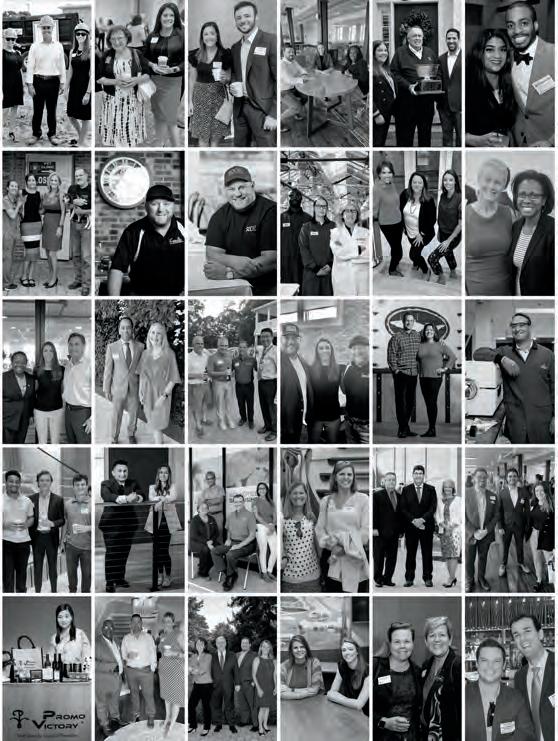


››Delaware is undergoing a transformative period, with demographic shifts, labor force changes, economic challenges, and new opportunities shaping its trajectory. This white paper provides a comprehensive analysis of key trends affecting the state, utilizing a PESTLE framework (Political, Economic, Societal, Technological, Legal, and Environmental) to guide strategic planning.
DEMOGRAPHICS & WORKFORCE SHIFTS
Delaware’s population has grown by nearly 21% since 2006, largely driven by an aging demographic. The population of residents aged 65 and
older has surged by 92%, while growth among prime working-age individuals has been modest. Fertility rates remain below replacement levels, reflecting a nationwide trend, and labor force participation has declined from 62.3% in 2019 to 59.2% in late 2024.
While the state benefits from positive domestic and international migration, workforce challenges persist. The number of older workers has doubled in the past two decades, yet early retirements and declining participation rates present long-term concerns. Delaware must address talent shortages and enhance workforce retention to sustain economic growth.
Delaware’s economy has expanded but at a slower rate than many states. Employment grew just 0.6% from 2023 to 2024—one of the lowest rates nationwide. Future projections indicate a 6.6% job increase by 2034, with healthcare, finance, and transportation sectors leading growth. However, key challenges include:
• Labor Force and Skills Gap: The state’s talent pipeline must align with industry needs, requiring investment in education and workforce development.
• Cost of Doing Business: Delaware ranks 44th in business costs, with high

corporate tax rates and rising operational expenses impacting competitiveness.
• Regulatory Efficiency: Businesses cite permitting delays and regulatory burdens as barriers to growth, necessitating policy reforms to improve responsiveness.
Housing affordability has become a critical concern, with home prices increasing by 56.2% in the past four years. Despite stable homeownership rates, rising costs may deter workforce attraction. Delaware must balance supply and demand through regulatory adjustments to ensure long-term affordability.
The rise of Artificial Intelligence (AI) and automation will significantly impact Delaware’s workforce. Key industries, including finance, healthcare, and retail, must adapt to evolving technologies while ensuring workforce preparedness.


Delaware has the lowest labor force participation rate among its neighboring states.
Additionally, the state’s innovation ranking (35th) suggests a need for stronger research, development, and entrepreneurial support.
To maintain economic strength and competitiveness, Delaware’s leaders must prioritize:
• Workforce Development: Expanding training programs, attracting skilled workers, and retaining graduates
• Business Climate Improvements: Streamlining regulations, enhancing tax policies, and improving infrastructure
• Housing & Affordability: Addressing housing shortages and cost-of-living concerns
• Technology & Innovation Investment: Supporting AI adoption and
fostering a robust startup ecosystem
• Public-Private Collaboration: Strengthening partnerships to drive economic development
By addressing these challenges and leveraging emerging opportunities, Delaware can position itself as a leader in economic growth and quality of life for residents and businesses alike.
Researched and written by Ted Abernathy of Economic Leadership.
To view the full white paper, please scan this QR code:

BY PATRICK T. HARKER
››On June 30, I will reach the Federal Reserve’s time and service limits as president and CEO of the Federal Reserve Bank of Philadelphia. In other words, it’s time to say goodbye to this position I’ve truly enjoyed for ten years.
As I contemplate this impending retirement, it is giving me a natural opportunity to look back over the entire course of my career. Suffice it to say, this small-in-size-only state has played an outsized role in my professional life for the past 18 years.
Although I had lived, studied, and worked within just a few miles of Delaware for most of my life, my direct involvement with the First State didn’t begin until July 1, 2007—the day I assumed the presidency of the University of Delaware. The eight years I spent leading the state’s flagship university provided me a first-hand view of the underpinnings of Delaware’s economy and introduced me to so many of the people who make it run.

invaluable to me and my colleagues at the Philadelphia Fed. I have also taken them directly to the Federal Open Market Committee conference table in Washington, D.C.
first felt and to work accordingly for the benefit of every community across the entire district.
And throughout the past decade at the Philly Fed, I have relied upon that knowledge and those contacts, along with many others, to provide me with the soft data that has helped convert the black-and-white economic numbers I receive into living color.
Through you, I have been able to get a much more vibrant picture of economic conditions across Delaware. From conditions facing the credit card industry, to small-business activity and manufacturing, to tourism, to the poultry industry—and all other matters in between—these insights have been
The Third District is the smallest by area of the 12 districts that make up the Federal Reserve System. But, like Delaware, what this district may lack in size it more than makes up for in impact. Moreover, being compact provides its advantages. For one, I can travel the length of the district in a day, which has proven beneficial for meeting with people where they work and live. Additionally, an economic happening in one corner of the Third District is likely not going to be an independent event but can have a ripple effect all the way to another corner. Your reports on conditions as you see them here in Delaware have allowed me to track these ripples from the moment they are
I cannot thank you enough for never being shy about your thoughts and opinions. I cannot thank you enough for the way you have always welcomed me and others from the Philly Fed into your communities for in-depth discussions on what you’re seeing, what you’re hearing, and what you think we need to take a look at, too. Yet as much as I write those words in the past tense, my thoughts remain very much in the present. Make no mistake: Though my remaining service time at the Philly Fed is limited, I am committed to the task until my retirement. We currently face any number of uncertainties, both nationally and globally—from the continuing efforts to bring inflation to heel to responding to the impacts of shifts in economic policies—and I will continue to watch the data, listen to your reports, and act accordingly.
My closing hope is that you will welcome my successor at the Philadelphia Fed with the same openness and sense of partnership that has highlighted our work together. A strong focus on soft data is vital and has changed the way we work for the better. Continuing to provide your timely insights to my colleagues at the Philly Fed will keep breathing life into raw data.
But most of all, I hope you will accept my sincerest thanks for all that Delaware has meant to me over the past 18 years.
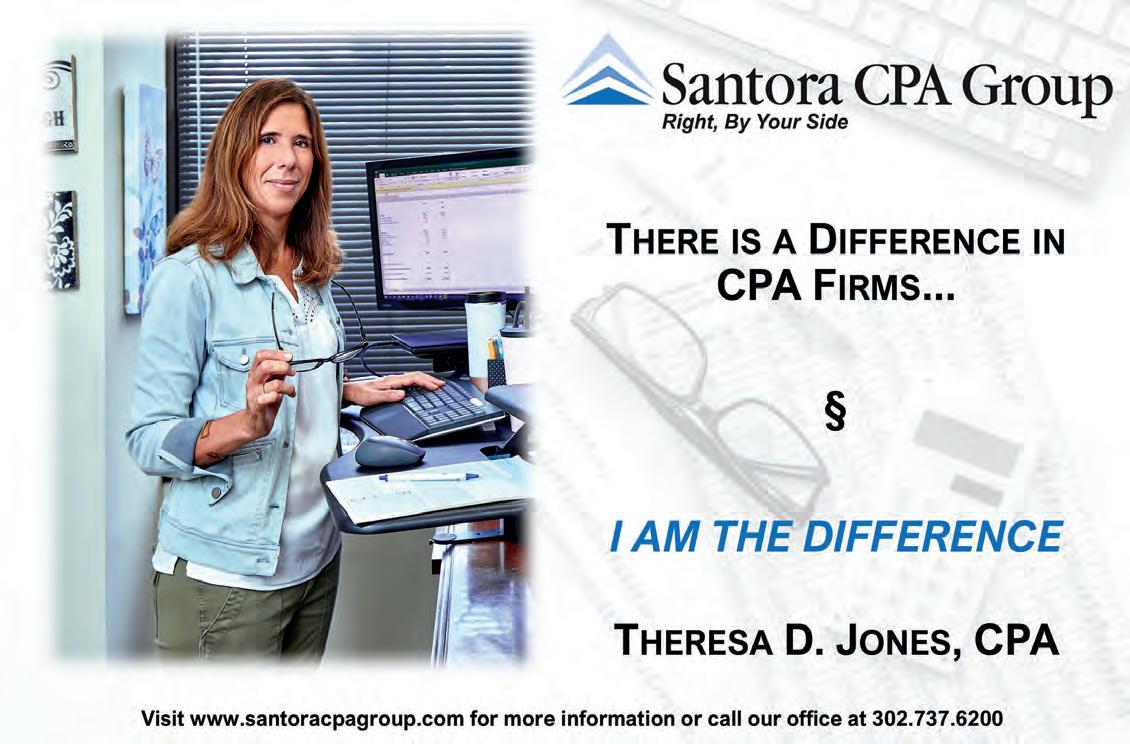
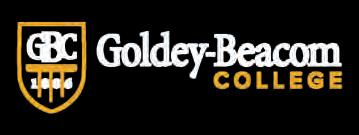

ALZHEIMER’S ASSOCIATION, DELAWARE VALLEY CHAPTER
www.alz.org/delval (215) 399-9209
399 Market St., Ste. 250 Philadelphia, PA 19106
The Alzheimer’s Association Delaware Valley Chapter is the premier source of information and support for the more than 489,000 residents in Delaware, New Jersey, and Pennsylvania who are living with Alzheimer’s disease and their more than 809,000 caregivers.
AMERIHEALTH CARITAS DELAWARE
www.amerihealthcaritas.com (302) 898-2101
220 Continental Dr., Ste. 300 Newark, DE 19713
AmeriHealth Caritas Delaware has been chosen as one of the Medicaid managed care plans for the Diamond State Health Plan and Diamond State Health Plan-Plus programs. Its mission is to help people get care, stay well, and build healthy communities.
B&M MEATS INC.
www.bmphillysteaks.com (302) 655-5331
21 Commerce St. Wilmington, DE 19801
B&M Meats Inc., located in Wilmington, Del., is a Philly steak meat manufacturer that supplies first-line distributors across the country and internationally with thin-sliced beef and chicken.
DWYER WORKFORCE DEVELOPMENT
www.dwyerworkforcedev.org (215) 485-4521
2 Hamil Rd., Ste. 245 Baltimore, MD 21210
Dwyer Workforce Development is an innovative nonprofit that provides certified nursing assistant training and healthcare job placements to individuals seeking opportunity and careers in the healthcare industry.
www.fairdinkum.com (302) 328-9280
15 Reads Way, Ste. 105
New Castle, DE 19720
Fairdinkum is a leading full-service IT consulting firm with more than two decades of experience. It specializes in proactive technology solutions with an emphasis on customer service to meet business needs.
ICANIO TECHNOLOGIES INC.
www.icanio.com (302) 480-9804
2093 Philadelphia Pike, Ste. 5056 Claymont, DE 19703
Icanio Technologies delivers AI/ML, software development, cloud, data, QA, and support services. With more than 200 experts, it empowers global businesses through automation, innovation, and digital transformation.
IMC CONSTRUCTION
www.imcconstruction.com (610) 889-3600
3 Great Valley Pkwy., Ste. 200 Malvern, PA 19355
For more than 49 years, IMC Construction has improved lives and environments in the communities it serves. It is recognized as the nation’s largest minority-owned commercial general contractor, and one of the top consultative commercial contractors in Philadelphia.
IMPACT LIFE INC.
www.impactlifetpoday.org (443) 981-9443
P.O. Box 1269
Hockessin, DE 19707
Impact Life offers peer-led recovery support, harm reduction services, and recovery residences in Delaware and Cecil and Harford counties in Maryland.
JEWISH FAMILY SERVICES OF DELAWARE jfsdelaware.org (302) 478-9411
99 Passmore Rd. Wilmington, DE 19803
Jewish Family Services of Delaware is a place where all members of the community can receive help and support to overcome life’s challenges and navigate difficult situations with compassion and respect.
NAMI DELAWARE
www.namidelaware.org (302) 427-0787
2400 W. Fourth St. Wilmington, DE 19805
The National Alliance on Mental Illness of Delaware is the state’s largest grassroots source of educational resources, support groups, crisis intervention training, housing, advocacy, and a HelpLine.
TARABICOS GROSSO LLP
www.tarabicosgrosso.com (302) 584-5407
100 West Commons Blvd., Ste. 415 New Castle, DE 19720
Tarabicos Grosso provides legal expertise for the business, real estate, zoning, and land development needs of landowners, developers, builders, and investors in Delaware, Maryland, Pennsylvania, and New Jersey.
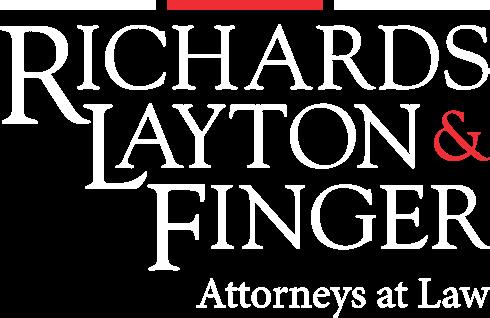




















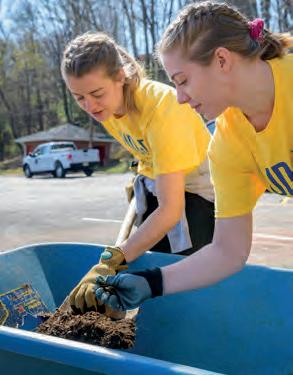

1. We hosted a networking breakfast at Delaware Technical Community College’s new Allied Health Center of Excellence. Photo by Andrew Mancuso.
2. Governor Matt Meyer, Lt. Governor Kyle Evans Gay, and Congresswoman Sarah McBride all gave remarks at the State of the Guard.
3. Gus Faucher, chief economist at PNC Financial Services Group, served as a featured keynote at our Spring Manufacturing and Policy Conference.
4. Governor Matt Meyer also delivered keynote remarks. Photo by Andrew Mancuso
5. Agilent Technologies’ Resolve handheld Raman spectrometer was named the 2025 Coolest Thing Made in Delaware. Photo by Andrew Mancuso.
6. The Delaware Young Professionals Network hosted a panel discussion focused on navigating work and wealth for young professionals at The Mill in downtown Wilmington. Photo by Rebecca Parsons.
7. Intern Delaware partnered with Rowan University to host a bus tour highlighting Delaware’s internship and employment opportunities.

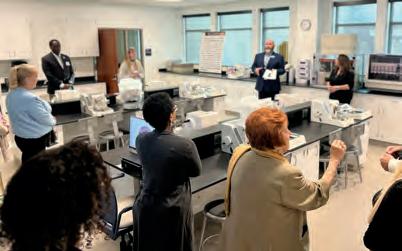
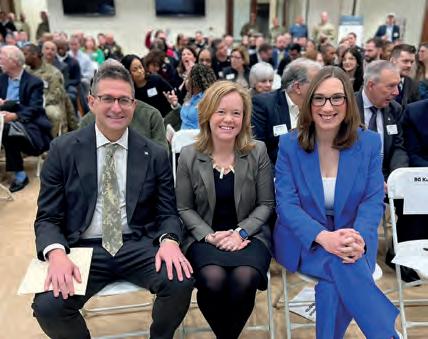
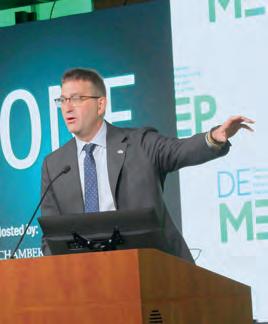


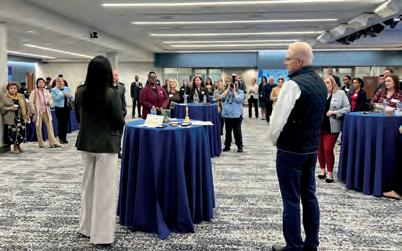



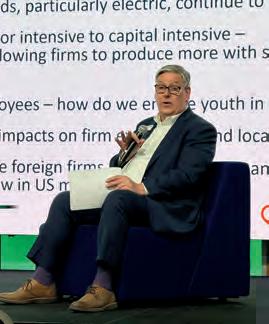
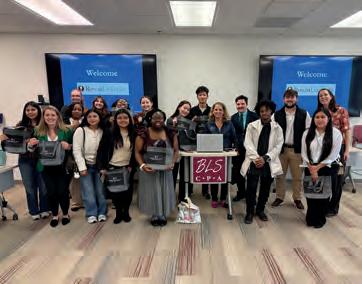









The Delaware State Chamber of Commerce and its workforce development affiliate, The Partnership, Inc., are pleased to announce the 2025 Superstars in Education & Training award winners
PHOTOS
BY NICK WALLACE PHOTOGRAPHY
THERE IS NO QUESTION that a healthy economy requires a strong workforce. A skilled and educated workforce draws businesses to Delaware and encourages existing businesses to stay and expand here. Whether college-bound or preparing for a technical or trade job, individuals must be equipped with the knowledge and skills to be successful. Superstars in Education and Training seeks to celebrate programs that contribute to developing the state’s workforce—of today and tomorrow.
Since 1989, the awards program has been recognizing educational programs for innovative and impactful programming. This year, the program streamlined the application process, enhanced focus on measuring collaboration and impact, and introduced a new category—corporate training—designed to recognize businesses that are actively upskilling and developing talent within their organizations. An award is given to one independent training and certificate provider, a corporate training program, a higher education program, and a Delaware high school program. Awards
of Excellence are also granted to deserving programs.
The 26 members of our selection committee met over the course of three months to choose our honorees. The rigorous process included reading and scoring applications, meeting to discuss the merits of each application, and finally, making site visits for a firsthand look at the finalists in action. Our selection committee returned full of excitement and stories from the site visits.
The 2025 Superstars in Education and Training award winners—all of which exemplify creativity and efficacy in workforce development initiatives— are Pathways to Success, M. Davis & Sons, Delaware Technical Community College, and MOT Charter High School. Polytech Adult Education, The WRK Group, and the Delaware Municipal Electric Corporation (DEMEC) were also named as Award of Excellence recipients. The winners were recognized during an awards luncheon at the Navigating Delaware Pathways Summit at Bally’s Dover Casino Resort at the end of April.
The Pathways to Success (PTS) program empowers underserved students in Delaware by providing them with the skills, mentorship, and resources needed to break the cycle of poverty and achieve success. Currently serving 400 students and impacting over 3,000 in the last 19 years, PTS places dedicated coordinators in multiple high schools statewide to offer daily support, one-on-one mentoring, and after-school sessions. The PTS program also emphasizes career readiness, offering training in customer service, teamwork, resume writing, interviewing, and leadership. Rooted in the C.A.R.E. model—Consistency, Authenticity, Respect, and Empowerment—PTS ensures that students receive the guidance they need to graduate and transition into higher education, the workforce, or the military with long-term success.
The M. Davis & Sons Welding Training Program gives their employees the opportunity to upskill and advance their careers. For more than 26 years, the company has offered voluntary, in-house training twice a week, led by AWS-certified instructors. Employees can practice different welding techniques, earn new certifications, and qualify for higher wages based on their skill level. The program is open to full-time employees with welding experience, including those who started through vocational programs or co-op positions. With dedicated training spaces and hands-on instruction, M. Davis & Sons is ensuring both career growth for their employees and a steady pipeline of highly skilled welders ready for any project.
Delaware Technical Community College’s Commercial Driver’s License (CDL) program prepares students for careers in the trucking industry with a 240-hour course that combines classroom instruction with hands-on training. Students gain experience driving diesel-powered tractor-trailers on a private range and public roads, as well as using a CDL simulator to practice challenging driving conditions. With small class sizes and flexible scheduling options, the curriculum covers truck operation, cargo handling, inspections, trip planning, and industry regulations. Graduates earn a CDL Class A license, opening doors to well-paying jobs in high demand across multiple industries.
High
MOT Charter High School’s Career and College Ready Capstone Program immerses students in real-world STEM experiences while preparing them for college and careers. Working within a simulated company structure, students take on leadership roles and collaborate on engineering and technology projects aligned with their career interests. With over 50 project options, students apply STEM knowledge while developing key skills like project management, teamwork, and communication. Guided by industry mentors, alumni, and college
Patrick Best WSFS Bank
Connor Brown L&W Insurance
Desa Burton Zip Code Wilmington
Kelly Ann DeCurtis Pepco Holding Company
Nathan Elton University of Delaware Career Center
Tierra Fair United Way of Delaware
Kimberely Hamill Delaware SHRM
Bryan Horsey Delaware Office of Work Based Learning
Dr. Lora Johnson Delaware Technical Community College
Jessica Jordan DuPont
Nicole Kennedy Rodel
Dr. Michelle Kutch Brandywine School District
Katie Lakofsky Delaware BioScience Association
Charles Madden
Delaware Prosperity Partnership
Kendall Massett
Delaware Charter Schools Network
Anna McDermott Food Bank of Delaware
Keisha Morris Bayhealth
Aisha Ortiz Delaware SHRM
Dr. Rob Rescigno Collaborative Consulting, LLC
Yvette Santiago Nemours Children’s Health
Heather Shupe
Joanna Staib
Delaware Workforce Development Board
Tamara Stoner
Delaware State University
Rachel Turney
Delaware Department of Labor
William Wojciechowski Wilmington Trust Company
professors, students refine their technical and professional competencies. The program culminates in a formal presentation to an expert panel, where students showcase their work and receive valuable feedback.
Higher Education Program
THE WRK GROUP, THE RISE PROGRAM Independent Training & Certificate Provider
DEMEC, LINEWORKER TRAINING PROGRAM Corporate Training Provider
THANK YOU TO OUR GENEROUS SPONSORS:
Leadership:




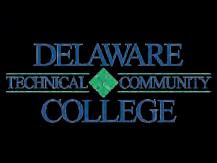








Notebook Sponsor: Coffee Sponsor:

















*as of 4/22/25

BY AMANDA SCHIMMEL
AS TECHNOLOGY AND INDUSTRIES continue to evolve, the demand for skilled engineers and STEM professionals is higher than ever before. Despite this, there remains a notable disconnect between the skills students gain in the classroom and the practical demands of the workforce. The Career and College Ready Capstone Program at MOT Charter High School addresses this gap by offering students hands-on experience and industry-focused knowledge essential for success in higher education and beyond.
The objective of the program is simple: to prepare students by engaging them in team-based projects that reflect real-world engineering and STEM
challenges. These projects, directly tied to the students’ intended college majors and career interests, require them to apply prior engineering and STEM knowledge while developing essential career-ready skills.
“These skills, including communication, critical thinking, project management, professionalism, and teamwork, are vital for success in the continuously changing workforce,” explains Roger Seedorf, engineering instructor and capstone program advisor at MOT Charter High School.
The program is an integral part of the engineering curriculum at MOT Charter High School, available to all career and technical education (CTE) students. Selecting from over 50 projects across various engineering and

STEM disciplines, there is something to captivate every interest. The projects are structured within a simulated real-world company hierarchy, where students assume leadership roles such as vice president, chief technology officer, operations director, program manager, and project manager.
Seedorf adds, “Each student plays a vital role in the day-to-day operations, just like in a professional company, and this hands-on approach develops not only technical abilities but also the leadership and collaborative skills that employers value.”
Two capstone options are offered: a shorter engineering III capstone and an engineering IV yearlong capstone. Both capstone projects culminate in a 1 1/2-hour team and individual presentation before an expert panel, which includes administrators, instructors, mentors, industry professionals, and college professors. At this final presentation, each team provides a set of deliverables that showcase the project’s success; these can include a team portfolio, individual portfolios, a marketing video, a technical paper, résumés, engineering notebooks, and more.
In addition to technical skills achieved through industry-recognized certificates, the program also teaches soft skills essential for career success. Students are required to complete a series of mini-courses covering topics such as team dynamics, conflict management, communication, project management, and ethics. They must also pass a proficiency assessment in professionalism, and those who excel in these areas are awarded a Mastery in Professionalism certification that was created in conjunction with industry partners.
“Over 90% of our students earn top grades, and nearly half are entering STEM careers as underrepresented groups, breaking barriers in STEM fields,” Seedorf remarks. The success of the program is not just reflected in
the high grades and 100% college placements of its students but also in its strong track record in state and national STEM competitions. Over the last five years, teams from the program have earned top honors in STEM- and engineering-related competitions, including national first- and second-place finishes, as well as multiple top-10 placements.
Additionally, many industry professionals recognize the program as an excellent tool for developing the in-demand skills employers seek. As Zach Zipf, a MOT Charter High School alumnus, Purdue engineering graduate, and materials engineer at Steel Dynamics Inc., puts it: “The capstone program was without question a huge factor in my college and career readiness success.”
The success of the Career and College Ready Capstone Program can also be attributed to its robust network of partners, including NASA, DelDOT, the University of Delaware, MIT, and numerous other higher education and industry professionals. These collaborations provide students with valuable access to mentors, guest speakers, industry-standard software, and real-world projects that enrich their learning experience.
“Our industry and college partnerships provide our capstone students a tremendous insight into the changing world of work and the academic rigor necessary to succeed in challenging STEM majors,” adds Shana Noll, principal of MOT Charter High School.
As a 2025 Superstar in Education and Training, MOT Charter High School exemplifies how education can evolve to meet the demands of a rapidly changing workforce and better prepare students for rigorous college STEM majors. By equipping students with the technical expertise, leadership skills, and industry-specific knowledge they need to succeed, the program is helping to shape the engineers and STEM professionals of tomorrow—today. n

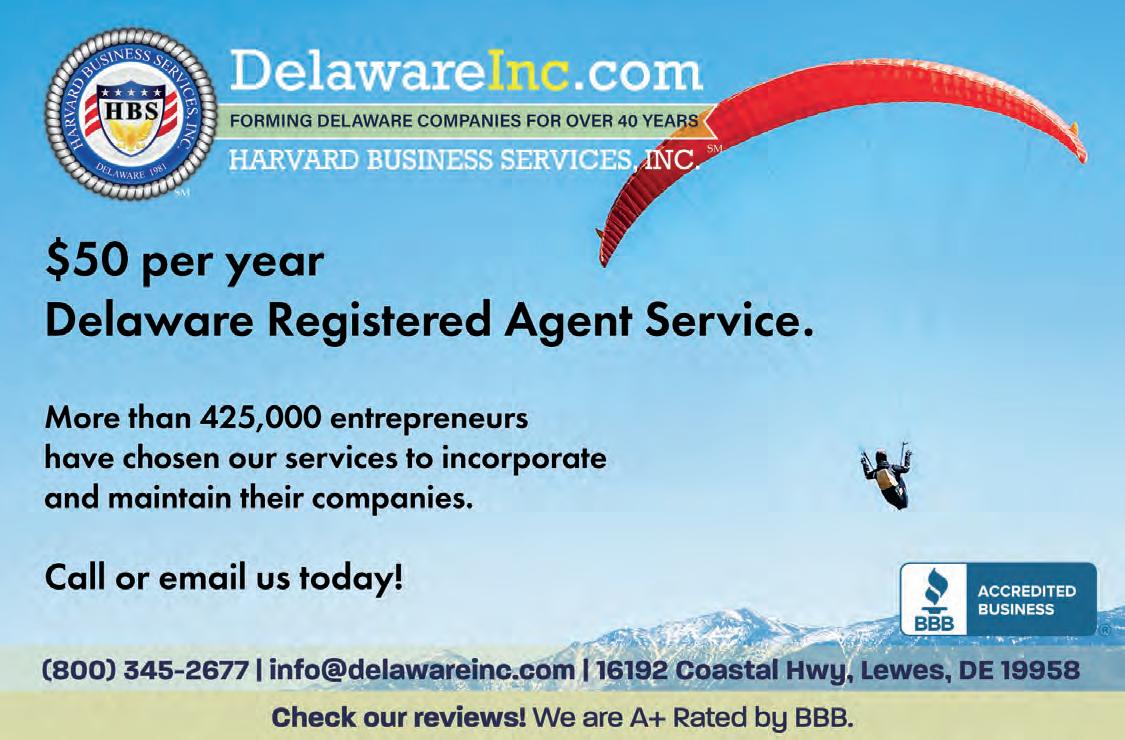


To secure the future of Delaware’s workforce, we must go beyond traditional internships and invest in next-level experiences that leave a lasting impact on top talent.
Intern Delaware is designed to help employers deliver these transformative experiences—providing professional development, mentorship, and exposure to the unique opportunities Delaware offers. Together, we can shape interns’ futures and inspire them to see Delaware as their career destination.
To learn more about sponsorship opportunities and the new “Intern All Access Pass”, contact Helana Rodriguez at hrodriguez@dscc.com.

CDL
BY AMANDA SCHIMMEL
AT DELAWARE TECHNICAL COMMUNITY
COLLEGE, the Commercial Driver’s License (CDL) program isn’t your average training program. It’s a direct path to a stable, well-paying career and a key solution to the nationwide shortage of truck drivers. By offering a hands-on, comprehensive curriculum, Delaware Tech ensures that students gain the skills needed to succeed in one of the most in-demand industries in the country.
Delaware Tech’s CDL program isn’t just about getting students behind the wheel; it’s about providing them with a thorough understanding of the trucking industry, from truck operation and cargo handling to inspections and trip planning. The 240-hour curriculum combines classroom learning with practical, hands-on experience, so students are well-prepared to take on real-world challenges.
Training takes place on a private range and local streets, but what sets
this program apart is its use of the Virage CDL simulator. “This advanced tool helps students master complex scenarios—like driving in inclement weather or heavy traffic—before they even hit the road,” explains Chris Moody, associate vice president of workforce development at Delaware Tech. The program is also offered in flexible formats, including weekday and evening/weekend options, designed to fit a variety of lifestyles and commitments.
Upon completion, graduates earn their CDL Class A license and are ready to enter the workforce. Moody adds, “With a shortage of 80,000 drivers right now and nearly a million more needed over the next decade, our CDL program plays a crucial role in getting qualified drivers immediately into the workforce to fill these critical vacancies.”
Partnerships with leading employers like Dot Foods, Mountaire Farms, and Werner play a key role in the program. Guest lectures, hands-on


demonstrations, and internship opportunities are all examples of this industry collaboration, which helps students connect theoretical knowledge and practical experience. Similarly, many graduates of the program go on to work with its partners, creating a sustainable pathway to employment. These partnerships also ensure that the curriculum meets the specific needs of employers. “For example, when new regulations or safety protocols are introduced in the trucking industry, we collaborate with our partners to incorporate the changes into our training materials. This helps keep our graduates prepared for the latest industry standards and increases their employability,” Moody explains.
Delaware Tech’s CDL program delivers real results. An impressive 96% of students who enroll complete the program, and last year, every graduate earned a Class A commercial driver’s license.
But it’s not just about the numbers. The real success is in the stories of the graduates whose lives have been transformed. Many students report a dramatic increase in income after completing the program, with some seeing their salaries more than double. One graduate, for example, went from earning $30,000 to $85,000 per year, providing a brighter future for his family.
Delaware Tech’s CDL program is a vital resource for filling a critical gap in the workforce and ensuring that the trucking industry can continue to grow and thrive. By offering high-quality training, fostering strong industry partnerships and focusing on career success, Delaware Tech is not only helping students build stable careers but also supporting the region’s economy and businesses that depend on reliable transportation. n





Partneringon Tomorrow's HealthcareWorkforce
Nemoursactivelyworks withlocalschoolsand communityorganizations to create pathways for students to enterthe healthcareworkforce.

CALLING ALL DELAWARE BUSINESSES:
Offer Work-Based Learning Today!
Work-based learning educational experiences are directly linked to realworld workplaces. Work-based learning ranges from guest speakers or workplace tours to internships and immersive apprenticeships . Work-based learning:

Helps student identify career options and start building relevant skills
Creates a qualified local workforce for Delaware – securing the state’s economic future
Introduces employers to their future workforce and connects industry to new and diverse perspectives
Scan here to learn more about work-based learning in Delaware from the Office of WorkBased Learning:

BY AMANDA SCHIMMEL
FOR NEARLY TWO DECADES, Pathways to Success (PTS) has been a resource for underserved and underrepresented students across Delaware. Founded in 2008 by Executive Director Fay Blake, PTS empowers youth by providing the skills, support, and opportunities they need to thrive. By closing the education gap, reducing dropout rates, and guiding students toward successful futures, the program has impacted more than 3,000 students. Today, it serves 400 students across five high schools statewide, helping them overcome barriers to success.
PTS is dedicated to helping students break free from the cycle of poverty by providing them with essential life skills and career training. The program identifies students facing academic and behavioral challenges through a combination of school assessments, attendance records, and disciplinary histories.
With this data, PTS is able to offer targeted support, equipping students with the tools they need to thrive both in school and beyond. “This approach allows us to intervene in real time, offering critical support and dropout prevention services,” says Blake. “Many of these students possess strong work ethics and positive attitudes; they just need the right guidance to help them get back on track.”
Students enroll in ninth grade and continue to receive support for a full year after graduation, ensuring they have the help needed as they transition into adulthood. Throughout their time in the program, PTS coordinators provide personalized mentorship, offering both in-school and after-school sessions tailored to each student’s needs. Soft skills are equally emphasized, with students receiving hands-on training in areas such as teamwork, communication, time management, integrity, and customer service.

“I started Pathways to Success because I wanted to give back to the community that raised me. I know firsthand the challenges these students face, and I couldn’t be prouder of the progress we’ve made in helping them build brighter futures.” — Executive Director Fay Blake
“We provide tutoring, financial literacy education, occupational skills training, workforce preparation, and leadership development in these programs,” adds Sarah Gilmour, the outreach coordinator for PTS. “Our comprehensive curriculum equips students with the essential skills that future colleges and employers look for.”
PTS draws directly from the C.A.R.E. model, which serves as a guiding framework for behavior modification and support. C stands for consistency—being there when students need help; A for authenticity— engaging with honesty and integrity; R for respect—treating each student with dignity; and E for empowerment—providing the tools and opportunities for students to realize their full potential.
In addition to academic guidance, the program is uniquely designed to offer real-time support during personal crises. Whether it’s homelessness, family issues, or academic struggles, PTS is available 24/7, offering immediate intervention to ensure every student gets the help they need.
To equip students with real-world experience, PTS leverages its longstanding partnerships with local businesses, community organizations, and educational institutions, offering valuable work experience and certifications. Notable partnerships include SoDel Concepts, The Meoli
Companies, and Delmarva Power.
“One of our standout initiatives is our Powering the Workforce Utility Training Program, developed in collaboration with Delmarva Power,” Gilmour explains. “This eight-week training course has the potential to transform the lives of our students and their families, opening doors to stable, well-paying jobs.”
Partnerships like these not only provide immediate career opportunities but also contribute to the program’s broader success in preparing students for life after graduation, with PTS showing an impressive 98% graduation rate. Among the 2024 graduates, 80% are currently enrolled in college, while 18% have entered the workforce. The program’s Work Experience Initiative has also achieved a remarkable 90% job placement rate, providing students with invaluable work experience and essential soft skills that contribute to long-term career success.
“I started Pathways to Success because I wanted to give back to the community that raised me. I know firsthand the challenges these students face, and I couldn’t be prouder of the progress we’ve made in helping them build brighter futures,” Blake finishes. “We are honored to be recognized as a 2025 Superstar in Education.” n








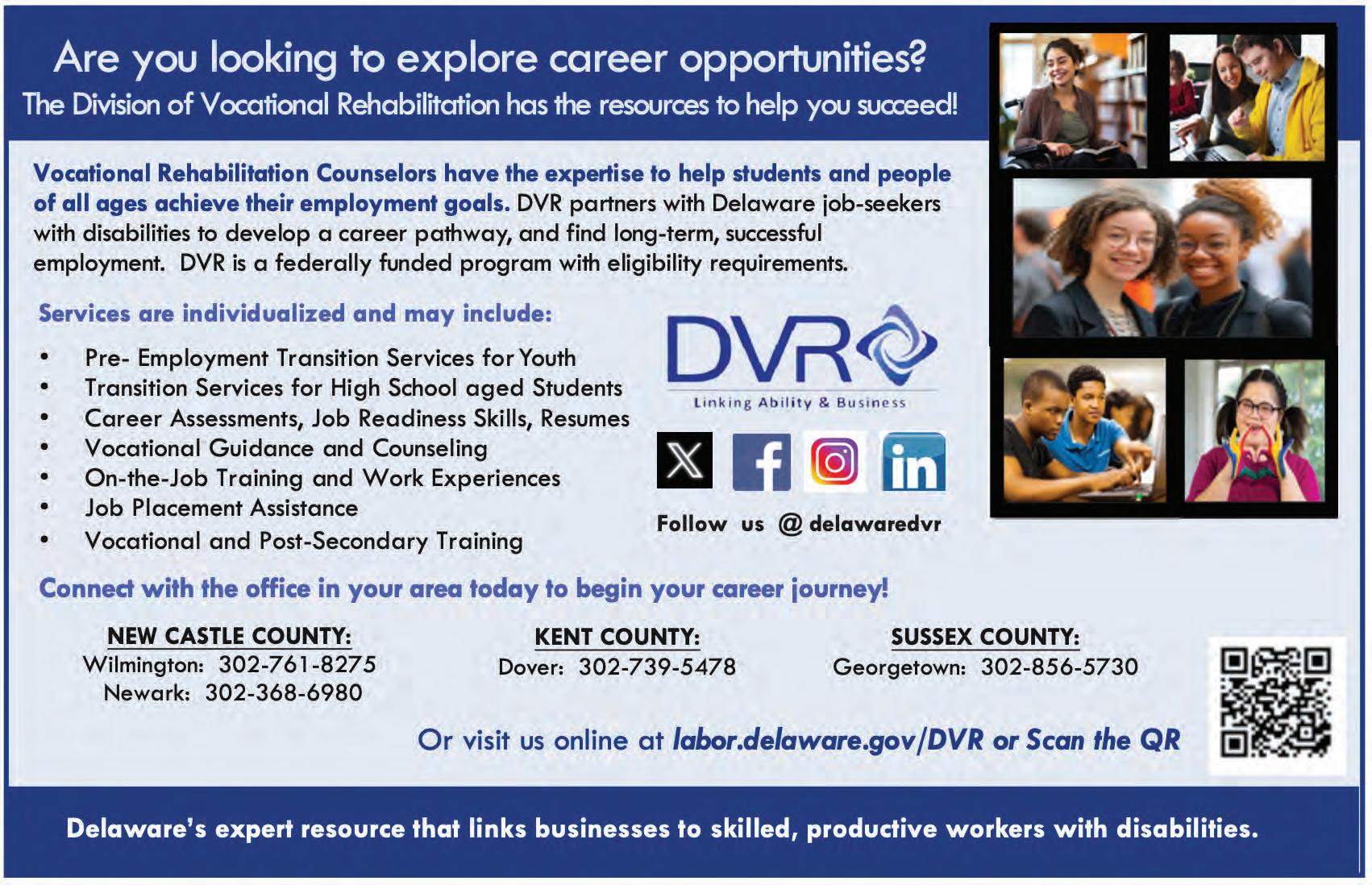

AT A TIME when skilled trades are in high demand, one local company is taking workforce development into its own hands—quite literally.
M. Davis & Sons, a fifth-generation industrial construction company, has received the inaugural Superstars in Education & Training Award in the Corporate Training Provider category. This new category recognizes businesses that invest in developing their workforce by providing training and upskilling opportunities to their employees.
The company’s Welding Training Program is a key part of its workforce development efforts, offering hands-on instruction and certification opportunities for their employees. The program is held at dedicated training spaces at their Kennett Square, Pa., and Havre De Grace, Md., fabrication shops, where participants gain real-world experience under the supervision of experienced welders.
“For nearly 26 years, we have been at the forefront of providing a unique opportunity for our employees to elevate their expertise and advance their
BY REGINA DONATO
careers,” said Heath Kroll, M. Davis & Son’s ASME Code Shop manager, who is the main point of contact for the Welding Training Program.
M. Davis & Sons developed its welding program in response to the growing shortage of skilled tradespeople, both internally and within the industry as a whole. “The decision to establish our own welding training classes just made sense,” says Kroll. “We had the welders already working here, and we have a funnel of vocational and technical high school students working as co-ops and staying on full time. Enhancing their skills through the in-house training aligned with our need to recruit and retain welding talent.”
Providing a structured pathway for employees looking to build a career in welding, program participants receive hands-on training in a controlled environment, ensuring they develop the technical skills necessary to meet industry standards. The higher the skill level that is passed with a certified weld coupon, the higher the wage that the employee can gain.

“Our welding training program not only creates high-quality tradespeople but more importantly, it transforms people’s lives with an entry into a career that will carry you through a lifetime.” —
ASME Code Shop Manager Heath Kroll
One of the defining aspects of the program is its emphasis on realworld applications. M. Davis & Sons has built a curriculum that prioritizes practical skill development, safety protocols, and adherence to industry regulations. “Our welding training program is structured to allow employees to gain the skills they need in a controlled setting before transitioning to job sites,” explains Kroll. The program ensures their welders meet ASME, AWS and API standards, which are critical for safety and quality in industrial construction.
M. Davis & Sons is also mindful of their employees’ busy lifestyles, so the program is held on a part-time flexible schedule. “Education is not confined to rigid schedules,” says Kroll. “Holding classes two nights a week accommodates the varied work commitments of our employees, ensuring that education is seamlessly integrated into their professional lives.”
Over the last year alone, the program has seen impressive participation, with 85 employees attending welding classes. While some participants attended only one class per week, most engaged participants completed the curriculum. The program’s success is evident in the results: 50 welders earned a total of 108 welding certifications.
Two recent success stories also highlight the program’s impact. Evan
Campbell joined M. Davis & Sons in 2023 without any welding certifications and was initially hired as a helper in the fabrication shop. Through a year and a half of commitment to the in-house weld training, Evan achieved multiple certifications and is now capable of welding any process, whether in the field or in the shop.
Similarly, Jacob Gold was hired in 2023 and has demonstrated remarkable progress and dedication. His expertise now extends to welding on API storage tanks and ASME vessels, and he has even contributed to developing and testing welding procedures.
As a family-owned company with more than 150 years in business, M. Davis & Sons continues to prioritize workforce development and sees it as a critical part of its mission. The Welding Training Program is just one example of how the company invests in its employees and prepares them for longterm careers in the skilled trades. And it is this investment that has deservedly earned M. Davis & Sons the title of a Superstar in Education and Training.
“We are all honored to be receiving this recognition,” Kroll finishes. “Our welding training program not only creates high-quality tradespeople but more importantly, it transforms people’s lives with an entry into a career that will carry you through a lifetime.” n




VALERIE WOODRUFF was a born teacher. At least, that’s what many of her elementary school instructors thought. They often asked her to sit near struggling students or tutor them. “I enjoyed it,” she says.
At her junior high school teacher’s request, she went into the hallway with a bright student who froze at test-taking time. Woodruff read the questions and recorded his answers. “This was in the ’50s, and the teacher was smart enough to accommodate him,” she says. “Can you imagine?”
The innovative example made an impression on Woodruff, whose career is punctuated by innovative approaches. She has been a teacher, guidance counselor, principal, and the Delaware Department of Education secretary. “I kept seeing the need for change,” she says of her career trajectory. “Something needed to happen.”
Woodruff was comfortable being the catalyst. Because of her dedication and contributions, she is the 2025 recipient of the Delaware State Chamber of Commerce’s John H. Taylor, Jr. Education Leadership Award.
Woodruff grew up in Weirton, W. Va. After graduating with a secondary education degree from Alderson Broaddus College, she taught English and social studies at Bohemia Manor High School in Cecil County, Md. In 1971, she received a master’s from the University of Delaware and became a guidance counselor at Delcastle Technical High School.
She realized that changes to policies and curriculum would benefit many of her students. So, she became the assistant principal and served on the Governor’s Advisory Council for Career and Vocational Education.
Woodruff kept moving upward, becoming the principal of Middletown High School in 1984. When the Division of Public Health and Department of Education suggested an on-site wellness center, she agreed, but only if they committed to continuing the program. She later joined the initiative to put a wellness center in every high school. In 1990, she was the Principal of the Year.
When friends and colleagues encouraged Woodruff to apply for the assistant secretary of education position, she realized it was another way to make a difference. “I was put in a position where I could affect some change and get things done that needed to be done,” agrees Woodruff, who oversaw federal programs, special education initiatives, and vocational
BY PAM GEORGE
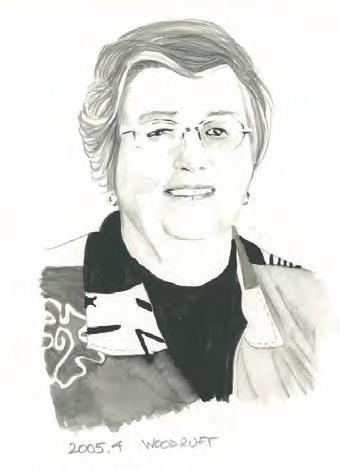
education, which had a special place in her heart after 10 years at Delcastle. Woodruff became secretary after serving as acting secretary upon Iris Mett’s departure. She was instrumental in helping pass teacher accountability laws and standards-based education policies.
In 2005, she was inducted into the Delaware Women’s Hall of Fame, organized by the Office of Women’s Advancement and Advocacy with the support of the Delaware Department of Human Resources and the Delaware Women’s Hall of Fame Committee.
The organization noted her membership on local committees, including her tenure as the executive board president of the Council of Chief State School Officers. However, Woodruff also was in the national spotlight. She was one of six people the U.S. Department of Education invited to discuss revisions to federal education policy.
In 2006, Vision 2015 was founded by a coalition of education, government, business, and civic leaders to focus on excellence, equity, and accountability to help students excel. The coalition is still operating with 2035 goals.
Woodruff believes the business community must do more to support public education, including praising the positives, not just pointing out the negatives. Businesses can also help students understand why they are studying specific courses. Even two-week internships can help students link their classroom subjects to the real world.
College is not for everyone, but learning will also give students an advantage. “It can be a trade program. It can be an apprenticeship. It can be a lot of things,” she says. “It doesn’t have to be a four-year college. You need to keep learning and keep an open mind.”
Not surprisingly, Woodruff admires people who “roll up their sleeves,” and get things done—“people who are advocates for things that are important.” She says John H. Taylor, Jr. was one of them.
“I first met him when I was secretary, and he was on the editorial board of The News Journal,” she recalls. “Every year, we were invited to talk to the editorial board. He would ask the hard questions, and he looked at me one time and said: ‘You don’t pull any punches.’ And I said: ‘No, I don’t.’”
Woodruff has received many honors, but the John H. Taylor, Jr. Education Leadership Award stands out. “It’s very special because I admire John so much,” she says. “And, so, to be given an award that is named for him is wonderful.” n
Apply now for the Marvin S. Gilman Superstars in Business Award and tell Delaware why you deserve star status!
BY
WINNERS RECEIVE:
• A professional video by 1440 Film Co. will be produced about your organization
• A feature story with professional photography in Delaware Business magazine
• A crystal Superstars in Business award and framed plaque
• 2 admissions to the awards ceremony on November 5, 2025 held at the historic HOTEL DU PONT
• AND all the exposure, publicity, and credibility that comes with being named a Superstar in Business!
Scan to view application:


This application form is a simple self-evaluation that can improve your business management skills and put you in the running to win the Marvin S. Gilman Superstars in Business Award!

S Ste p 1 / Self-Evaluation:
If your organization is a business, please use Form A.
If you are a nonprofit, please use Form B.
E Eligibility:
In business for at least three continuous years.
150 employees or fewer.
Previous Award of Excellence recipients and applicants who were not selected for an award may resubmit their same application up to three years back.
Previous Superstars in Business winners may re-apply after five years.
Please answer the questions by completing the application online at www.dscc.com/superstarsinbusiness. Electronic PDFs and paper versions are also available for reference, but your application must be submitted online. Please contact Kerri Welcher at kwelcher@dscc.com or (302) 576-6566 with questions.

S Ste p 2 / Submission:
All applications must be submitted online. Applications must be submitted to the Superstars in Business Selection Committee no later than Thursday, July 17, 2025, at 4:30 p.m. No late entries will be accepted. Please note that all submitted information remains confidential.
It is important to note that each question has a word count limit. Please follow those word count limits. Applications longer than the outlined limits will not be accepted.
Ste p 3 / Application Review:
Within each category, the finalists may be contacted for additional information or validation of the information submitted. The review made at this step is held in strict confidence.
Ste p 4 / The Awards:
Each winner will be presented with a special award recognizing their superior achievement on November 5, 2025, at a luncheon in the Gold Ballroom of the HOTEL DU PONT in Wilmington. Marketing and recognition will be given to all the Superstars in Business honorees throughout the year.
Awards may be judged in the following categories (Please note that final categories will be decided upon at the Selection Committee’s discretion based on the number of entries and quality of applications ):
• 1-15 employees
• 16-40 employees

• 41-150 employees
• Nonprofit
Below each question, we provided you with ‘Superstar Suggestions.’ They aim to help you form more robust answers and provide suggestions on what information may make your response more competitive. These are not requirements but will help judges compare your organization against other applicants. Please answer questions as concisely as possible.
EN TRY DEADLINE: Ju ly 17, 2025, at 4:30 p.m.

Q Questions?
Please contact Kerri Welcher at kwelcher@dscc com or (302) 576-6566

1. Business name, address, and phone; primary contact and CEO’s name, title, phone number and email
2. 450 words: Background information

Describe your business. (Superstar suggestion: Assume the reader has no understanding of your industry.)
List the number of years in business and briefly explain how your business was started.
Number of employees and average tenure (Please distinguish between full-time and part-time).
3. 450 words: Ple ase provide your business mission statement and/or business philosophy including core competencies and strengths How do you align your day-to-day operations to this statement/philosophy?
Superstar suggestion: Provide your mission statement, vision statement, guiding principles, or strategies for success. How is your mission statement communicated to your clients, employees, investors, and/or the general public (i.e., word of mouth, through marketing materials, etc.)? Also, explain how they were developed – were they customer or leadership driven, and how do you ensure they are understood by your entire company? Tell us here if you have team building meetings, strategy sessions, and/or safety meetings that may include a regular discussion on these important guiding statements.
4 450 words: What are your key metrics and tools and how are you measuring your results? How do you use these to proactively measure your pe rformance and guarantee future success?
Superstar suggestion: Here is the place to highlight any strategies and measures taken that resulted in savings, stability, or growth. You should be monitoring outcomes that are a consequence of its operational performance and then serve as predictors of future performance. How do your results measure up to other companies in your industry? Be specific and tell us about innovative tools you use to market or boost sales, which in turn produces a good ROI. Customer loyalty, years of experience, low associate turnover and industry awards are all competitive weapons. We want to know that your business is sustainable and will be around in the years to come. Actual financial metrics (i.e., revenue growth percentage, profit margin, days cash on hand, debt ratio, etc.) could separate your application from the competition. *Remain assured that all information is kept confidential.
5 450 words: When thinking about your customers, what makes your business stand apart from your peers and/or similar businesses?
Superstar suggestion: Use this question to outline how you identify customer needs and priorities. Tell us if you are measuring customer satisfaction or if you have moved to customer loyalty or customer advocacy. How do you engage your customers? Share with us how you brand your company and how you maintain it (i.e., social media, online networking, marketing campaigns). Tell us if you have a customer database or process to retain information about customers to use in the future. If you have a formal process for tracking and resolving complaints, highlight your program here and brag about your results. What makes your business a Superstar?

6. 450 words: A qualified workforce is a main concern for all businesses. How do you recruit and retain your associates?
Superstar suggestion: What are your key workforce practices and how are they directed towards creating and maintaining a highperformance work environment? How do you determine and meet the needs of your employees? If associate training or education reimbursement programs are a big part of your employee retention program or your quality/safety programs, please tell us about that too. Specific examples are appreciated.
7 450 words: What recent or current significant challenges other than COVID-19 have you had to overcome to continue to be a successful business? Identify and describe the steps you took
Superstar suggestion: How were the challenges identified, and did you anticipate them coming? If they couldn’t be predicted, what did you learn for the next time to make the company stronger? For these opportunities, financial or otherwise, how did the leaders of the organization rally and engage associates to adapt to change and meet the challenge? List challenges within the past two years.
8. 450 words: Discuss the nature and involvement of your community service efforts from leadership to employees.

Superstar suggestion: We want to know what organizations your company chooses to align with and why. How in-depth is your involvement? How does your owner/leadership’s commitment and involvement influence the corporate culture as it relates to community service efforts? Describe investments of time, as well as causes supported financially. Highlight efforts regarding care for our environment, care for underserved communities, and/or social equality. Do you have a formal program that includes fundraising or service hours donated? Are the commitments or passions you have for certain causes conveyed in your marketing, company brand, and culture?


1 Business name, address, and phone; primary contact and exe cutive director’s name, title, phone number and email
2 450 words: Background information:

• Describe the work of your nonprofit. ( Superstar suggestion: Assume the reader has no understanding of your industry)
• Number of years serving the community.
• Number of paid staff and average tenure (Please distinguish between full-time and part-time).
• Number of volunteers and their average tenure.
3 450 words: Ple ase provide your organization’s mission statement and/or philosophy, including core competencies and strengths How do you align your day-to-day operations to this statement/philosophy? Also please provide the number of people or groups that benefit from your organization (Please provide results for each of the last three ye ars)
Superstar suggestion: Provide your mission statement, vision statement, guiding principles, or strategies for success. How is your mission statement communicated to your beneficiaries, staff, board, contributors, and/or the general public (i.e., word of mouth, through marketing materials, etc.)? Also, explain how they were developed – were they constituent or leadership driven, and how do you ensure they are understood by your entire organization? Tell us here if you have team-building meetings, strategy sessions, and/or safety meetings that may include a regular discussion on these important guiding statements.
4 450 words: When thinking about your key constituents (i e , recipients of service, board members, donors, and/or customers), what makes your organization stand apart from your peers and/or similar nonprofits?

Superstar suggestion: Please use this question to outline how you identify constituent needs and priorities. Are you measuring their satisfaction? How do you engage your constituents? Share with us how you brand your organization and how you maintain it (i.e., social media, online networking, marketing campaigns, etc.) Tell us if you have a database or process to retain information about your constituents to use in the future. If you have a formal process for tracking and resolving complaints, please highlight your program here and brag about your results.
5 450 words: A qualified workforce and board of directors are main concerns for all nonprofits How do you recruit and retain your staff, board members, and volunteers?
Superstar suggestion: What are your key workforce practices, and how are they directed toward creating and maintaining a highperformance work environment? How do you determine and meet the needs of your staff, board, and volunteers? How often does your board meet, and are there term limits? What is the percentage of board members who make financial contributions to your organization? If associate training or education reimbursement programs are a big part of your employee retention program or your quality/safety programs, please tell us about that too. Specific examples are appreciated.
6 450 words: What recent or current significant challenges other than COVID-19 have you had to overcome to continue to be a successful nonprofit? Identify and describe the steps you took.

Superstar suggestion: How were the challenges identified, and did you anticipate them coming? If they couldn’t be predicted, what did you learn for the next time to make the company stronger? For these opportunities, financial or otherwise, how did the leaders of the organization rally and engage associates to adapt to change and meet the challenge? Please list challenges within the past two years.
7 450 words: List your organization’s functional expense allocation as a percentage of total expenses: Program Services ________ Fundraising ____________ Management & General______
8 What is the calculation of your unrestricted ne t assets to current operating e xpenses? How many months of cash do you have on hand?
9 450 words: Ple ase use the space below to provide a narrative that will help the selection committee understand the strength of your nonprofit’s financial position
Superstar suggestion: A well-run nonprofit should meet standards where at least 65% of its total expenses are on program activities. Please explain if your organization’s ratio is below that. Also, a well-run nonprofit should avoid accumulating funds that could be used for current program activities. To meet this standard, the organization’s unrestricted net assets should be no more than 3x the size of the past year’s expenses or 3x the size of the current year’s budget, whichever is higher. Please explain any variance from this standard. Examples may be that your organization is planning on a large capital project, introducing a new program, or amid a capital campaign, in which the organization is accumulating funds for that expense.

Over two million business entities from around the world call Delaware their legal home—including more than two-thirds of Fortune 500 companies—and in 2023, 80% of all new U.S. Initial Public Offerings chose to incorporate here. For generations, Delaware has set the gold standard for corporate law and governance, making it the trusted choice for businesses of all sizes. In the U.S., businesses are formed and regulated at the state level, and Delaware remains the premier destination for incorporation and business success.
Number of legal entities incorporated
Percentage of U.S.-based IPOs incorporated 80% Division of Corporations General Fund Revenue $2.05B
Percentage of Fortune 500 companies incorporated
2,451


BY TYLER O’CONNELL
SENATE SUBSTITUTE 1 for Senate Bill 21, which was signed into law by Governor Matt Meyer on March 25, garnered significant attention from both local and national media due to its potential impact on corporate governance and stockholder rights. Within the bill, Delaware amended Sections 144 and 220 of the Delaware General Corporation Law.
The Section 144 amendments provide safe harbor procedures for transactions in which directors, officers, or a controlling stockholder have potential conflicts of interest. In sum, the proposed amendments provide that directors’, officers’, or controlling stockholders’ potential divergent interests in transactions do not give rise to claims for equitable relief or damages, provided that, 1) the material facts as to the person’s interest in and involvement in the transaction, including any such potential conflicts, are disclosed; and 2) the transaction is approved in good faith by an informed majority of the disinterested directors or an informed majority of the disinterested stockholders.
In circumstances where a board does not have a disinterested majority of directors, to obtain protections from disinterested director approval, the act or transaction must be approved or recommended by a committee of at least two directors whom the board has determined are independent. The statute provides that board and committee approvals must be made in good faith and without gross negligence, consistent with fiduciary standards.
For controlling stockholder going-private transactions, both informed disinterested director and disinterested stockholder approval must be obtained. The amendments also recognize that transactions do not result in breaches of fiduciary duties if they are shown to be fair to the corporation and its stockholders, consistent with the “entire fairness” standard.
The amendments also define when a person may be found to be a
“controlling stockholder” or a member of a “control group,” primarily by reference to ownership of percentages of the corporation’s voting stock or by the power to appoint a majority of directors.
The amendments to Section 220, which concerns stockholders’ rights to inspect the corporation’s “books and records,” define certain types of documents that are subject to production in response to a stockholder’s books and records demand. The materials identified include, among other things, the certificate of incorporation and bylaws, stockholder agreements binding the corporation, board and committee minutes, materials presented, and annual financial statements.
The amendments provide that, in the absence of those types of documents, the Delaware Court of Chancery may order the corporation to provide other types of “functionally equivalent” documents as may be necessary and essential to satisfy the stockholder’s proper purposes. Similarly, the court has the authority to order the production of other documents based upon a stockholder showing a “compelling need.”
The amendments are intended to apply retroactively, except they do not govern cases that were pending or completed on or before February 17, 2025, which is the date the amendments were first proposed. The amendments similarly do not apply to stockholder books and records demands made on or before that same date. n


Potter Anderson provides a full range of legal services to local, national, and international clients and trusted co-counsel.
Whether it's corporate law, corporate litigation, intellectual property, commercial litigation, bankruptcy, labor and employment, or real estate, we are proud to be one of the largest and most highly regarded Delaware law firms.




Robert L. Byrd, Partner (302) 530-4531 · Robert.Byrd@byrdgomes.com
Rebecca Byrd, Esq., Partner (302) 690-4992 · Rebecca.Byrd@byrdgomes.com
Kimberly Gomes, Partner (302) 530-9093 · Kim.Gomes@byrdgomes.com
Tanner Polce, Government Affairs Specialist (410) 200-6029 · Tanner.Polce@byrdgomes.com
Carrie Cole, Operations (302) 757-8300 · Carrie.Cole@byrdgomes.com
(302) 757-8300 phone (302) 322-6000 fax www.byrdgomes.com

10 Corporate Circle Suite 215 New Castle, DE 19720









BY BRENT C. SHAFFER
COMMERCIAL PROPERTY ASSESSED clean energy financing (C-PACE, often referred to in Delaware as D-PACE) is longterm financing for the installation of qualifying energy improvements to commercial real estate, secured by special assessments levied on the real estate itself. D-PACE allows financing for energy improvements for up to 25 years—longer than the terms of commercial mortgage loans and the typical duration a commercial property is owned.
In 2018, Delaware joined other states in passing legislation for D-PACE. The statute, based on Connecticut’s C-PACE program, is captioned “Delaware Voluntary Clean Energy Financing Program Based on Property Assessments (D-PACE) or Other Local Assessments” and is found in Delaware Code Title 29, Section 8061, part of the Delaware Energy Act. The parties involved in D-PACE include the program administrator, a local taxing authority, a lender providing the financing, and the borrower. Delaware Sustainable Energy Utility, doing business as Energize Delaware—a
quasi-governmental nonprofit corporation established by Delaware statute— administers D-PACE statewide and reviews applications to determine whether the energy improvements qualify for the program.
The taxing authorities in Delaware are New Castle, Kent, and Sussex counties, and each has entered into a separate participation agreement with Energize Delaware, outlining how D-PACE is administered in its jurisdiction. Several private capital providers have funded D-PACE loans.
Eligible borrowers are those who own commercial property, excluding residential dwellings with fewer than five units. Qualifying energy improvements include equipment used in new construction or building renovations, clean energy systems, and qualifying waste heat recovery technologies.
The benefit assessments that secure D-PACE loans are levied by the county in the nature of tax assessments and appear on yearly tax bills. If the capital provider’s loan is not repaid, the provider can seek to collect
on its benefit assessment lien. The lien generally holds the same "super" priority as other tax assessments. Because of this, two groups opposed the implementation of D-PACE.
Real estate lenders were concerned about the assessments taking priority over their mortgages. D-PACE financing cannot be placed on any property without the consent of current mortgage holders. Initially, mortgage lenders were hesitant to grant consent, but several provisions in D-PACE significantly protect them.
First, these benefit assessment liens cannot be accelerated. If an assessment is unpaid, the capital provider can only collect past-due assessments, not the entire loan balance. This mirrors tax sales, where the taxing municipality cannot add future taxes to the sale amount.
Second, instrumental to the passage of the D-PACE legislation in Delaware, any sale to collect delinquent benefit assessments does not extinguish mortgage liens. Therefore, mortgage lenders should not view a D-PACE property as equivalent to lending on a property with a prior mortgage lien.
County tax assessment offices also had concerns. They worried that benefit assessments would interfere with tax monition sales for delinquent taxes and that Delaware’s tax sale statutes would not support the collection of benefit assessments. These concerns were addressed through several 2021 amendments to the D-PACE statute, which ensured that property tax liens are paid first from tax sale proceeds before benefit assessment liens. The
amendments also required D-PACE lenders to foreclose benefit assessment liens using legal attachment methods other than the standard monition sale.
Eventually, all three counties adopted the program: New Castle County signed a participation agreement on Sept. 10, 2019; Kent County on Jan. 13, 2021; and Sussex County on Feb. 2, 2021. The first D-PACE closing took place in February 2020, financing energy improvements to the historic DuPont Building in Wilmington.
D-PACE has become a more relevant source of capital for Delaware businesses in 2025 because mortgage lenders are now more likely to consent to D-PACE loans, understanding that properties with D-PACE function similarly to those with “extra” taxes (like properties in special improvement districts).
Businesses that own or develop commercial property in Delaware can use D-PACE to finance up to 100% of energy-saving improvements, benefiting from extended repayment terms, favorable capital provider interest rates, and the ability to sell without repaying the loan. n

















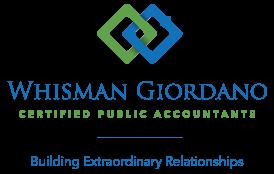



AS PRESIDENT of Highmark Delaware, I see firsthand the significant impact of our state’s rapidly aging population on health care. This demographic shift presents both considerable challenges and exciting opportunities for our community. The increasing number of older adults requires us to think innovatively about elder care, bolster our health care workforce, and expand access to a wider range of essential services. At Highmark, we’re committed to collaborating with Delaware businesses and nonprofit organizations to ensure our state’s health care system is prepared for the future.
Beebe Healthcare’s Family Medicine Residency Continuity Clinic exemplifies the kind of transformative initiatives we strive to support. Our $1 million investment through the BluePrints for the Community program is
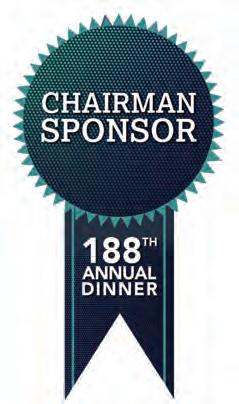
not merely financial assistance; it is the power of strategic collaborations and community-based care. Beebe’s expansion into this new facility demonstrates a keen understanding of where the needs are greatest, directly responding to the rising demand for high-quality, easily accessible primary care, particularly in Sussex County’s rapidly growing areas.
The expansion of services necessitated by an aging population highlights the health care workforce shortage experienced by our state. Securing the capacity to deliver quality health care is contingent on attracting, training, and retaining talent. Last year, Delaware Technical Community College opened the Highmark Healthcare Center for Excellence, located at their Terry Campus. This building houses state-of-the-art classrooms, labs, and
collaborative spaces for allied health shortterm certification programs.
Our higher education and health systems’ investments in training mitigates this issue by nurturing and establishing a pipeline of locallyfocused, engaged health care professionals. We believe this statewide dedication to workforce development is effective and critical to meeting the health care needs of our community, offering future scalability through sustained community health engagement and improved access to preventative care.

Our BluePrints for the Community investments have supported broader development programs that extend the workforces within ChristianaCare, Nemours Children’s Health, and St. Francis, each working tirelessly to improve the health and well-being of the communities we serve: ChristianaCare through its IMPACT Community Health Worker (CHW) program, embedded in high-need Medicare practices; Nemours supporting children with asthma to improve outcomes; and St. Francis creating a financially stable, purposefully designed campus to care for the whole person. These initiatives ensure health care needs are not just met, but that patients feel secure with people they trust.
Beyond Bricks and Mortar
Highmark’s support extends beyond bricks and mortar as we work to realize our vision of a world where everyone embraces health. Through our community health engagement initiatives, we facilitate and support collaborative efforts among diverse partners to achieve our mission of creating remarkable health care experiences for Delaware’s older adults and their families. This approach, coupled with investments in modern technology and expanded facility access—such as at the Bayhealth simulation lab or the Da Vinci Surgeon Console at TidalHealth—provides Delawareans with enhanced primary and specialist care.
A Shared Commitment to a Healthier Delaware Highmark remains fully committed to innovative projects and programs like those mentioned above. Through collaborations like these, and the dedication of health care systems statewide, we are collectively laying a strong foundation for all Delawareans at every stage of life. n
Margaret H. Rollins School of Nursing at Beebe Healthcare is a diploma nursing program with a strong tradition of academic excellence and extensive clinical experience in providing quality nursing education since 1921.
+100% NCLEX pass rate in 2023
+High-fidelity simulation labs and state-of-the art audiovisual equipment
+Dedicated faculty who are experts in their field
+The only accredited, hospital-based nursing program in Delaware
+ 2024 Award of Excellence for Higher Education from Delaware State Chamber of Commerce
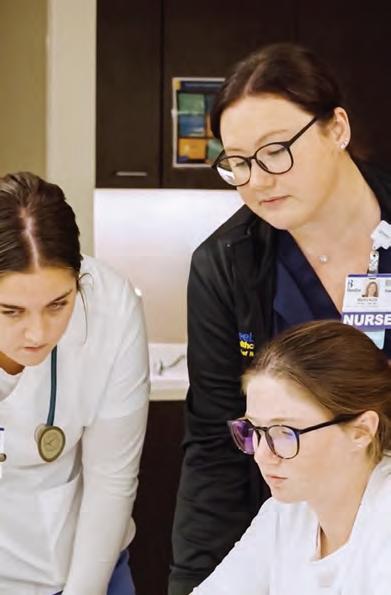
Margaret H. Rollins School of Nursing



BY PAUL R. SIERZENSKI, MD, MSHQS, CPE, FACEP AND AMANDA CONNOYER, DNP, PMC-HI, APRN, CNP, CENP
IT’S NO SECRET that the population in Sussex County is growing —and aging. With these changes come several challenges and opportunities, as the demand for healthcare services increases. Beebe Healthcare is making strategic decisions to build out programs for seniors and the families who have come to Sussex County. It is about providing services aligned with what our older generation actually needs and making it easier for all local patients to access and navigate our healthcare system.
At the forefront of this strategic transformation is the ability to serve people with the highest quality care, which means having the right mix of clinicians in place. Research shows that the need for additional primary care providers in Delaware is substantial. Knowing this, Beebe has invested in several initiatives and partnerships to boost our workforce.
Earlier this year, we announced a new partnership with ThriveAP, a nationally recognized organization that provides advanced practice clinicians (APCs) with education, training, and professional development
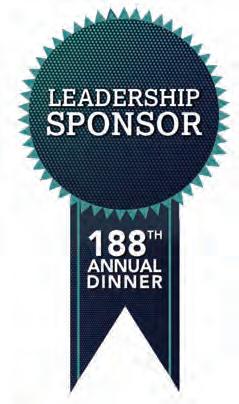
opportunities. Ongoing education guides our team on how to utilize the latest evidence-based practice guidelines to offer superior patient care and clinical experiences.
It also gives skilled clinical providers new reasons to choose Beebe as their employer. Our medical staff knows that by choosing to practice here, they are part of an organization that supports them and invests in their growth. Beebe is the first hospital in Delaware to partner with ThriveAP, and the program has been graciously funded by the Beebe Medical Foundation for the next three years.
Another key workforce development investment has been the continued growth of Beebe’s Family Medicine Residency. We launched this program in 2023, and its impact is already proving to be tremendous. We have carefully recruited resident physicians who graduated from medical schools near and far and who intend to devote their careers to family practice, to train here at Beebe. This summer, we will celebrate the opening of the new Long Neck
Family Medicine Residency Practice, which will allow us to expand our primary care services and accommodate patients in new ways.
Best of all, research shows that many clinical providers choose to stay in the communities where they trained long-term. All four members of our inaugural class of resident physicians have committed to stay with Beebe and care for Sussex County patients.
Medical education—and the potential for a medical school in Sussex County—has become a prominent statewide topic when discussing the need for more primary care clinicians. The success of our family medicine residency program—and others—further supports how valuable a medical school located in Sussex County would be to this growing population, and how Beebe is working to be part of the long-term solution.
While building our workforce for the future is a priority, Beebe is also focused on the current needs of our aging population. One initiative that exemplifies this commitment is our Doll Therapy Program for patients with dementia, Alzheimer’s, and other memory-loss conditions.
Dolls can reduce stress and loneliness, providing positive and calming distractions. Doll therapy, supported by evidence-based research, can dramatically improve a patient’s hospital experience and long-term quality of life. The feedback from families has been extremely positive, filled with heartwarming stories about the change in their loved one’s demeanor.
These examples of Beebe Healthcare’s strategic growth, planning, and innovation are centered on quality outcomes for our patients. Our journey to transform healthcare services to meet the needs of Sussex County is driven by a laser focus on providing the highest quality and safest care—or by partnering with a nationally recognized tertiary care center to streamline access to highly specialized services.
As we look to the future, Beebe remains steadfast in our commitment to addressing the evolving needs of our aging population. By investing in our workforce, embracing innovative care delivery models, and fostering partnerships that enhance our capabilities, we are ensuring that Sussex County residents receive the compassionate, high-quality care they deserve. n

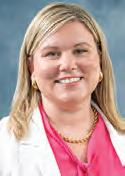
Paul R. Sierzenski, MD, MSHQS, CPE, FACEP, is the chief physician executive and Amanda Connoyer, DNP, PMC-HI, APRN, CNP, CENP, is the chief advanced practice clinician at Beebe Healthcare.
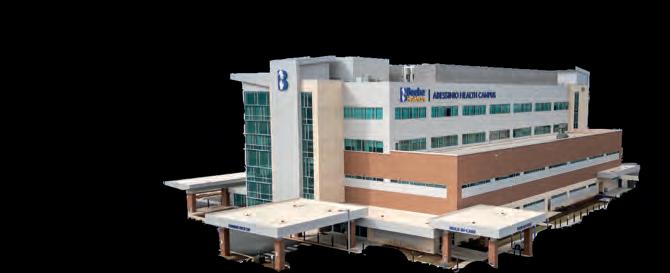
At Beebe Healthcare, we are committed to delivering the safest and highest quality care to the people of Sussex County. We are proud to have our Specialty Surgical Hospital in Rehoboth Beach nationally recognized by the Leapfrog Group as one of the 15 top rural hospitals in the country – and the only hospital in Delaware to earn this distinction. This honor is awarded to those that meet the highest standards for a variety of quality and patient safety measures.
Since opening in 2022, Beebe’s Specialty Surgical Hospital has quickly earned a reputation as a destination for surgical care for a range of needs – from general to orthopedic surgeries and breast and bariatric procedures. Our expert team leverages a range of minimally invasive techniques and robotic surgical systems, helping patients recover faster and get back to living their healthiest life.
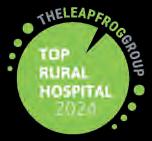

BY ANN B. WAYNE, BSN, RN
IN A BOLD STEP toward addressing the critical behavioral health needs of Southern Delaware, SUN Behavioral Delaware has expanded its services with the opening of a new outpatient building in Georgetown, making it easier for individuals to access the mental health and substance use disorder treatments they need.
SUN Behavioral Delaware is part of a network of four mental health hospitals across the United States dedicated to solving the unmet needs of those struggling with mental illness and substance use. By offering comprehensive and accessible care, the organization helps reduce the stigma surrounding mental health while supporting individuals on their path to recovery.
The new outpatient center offers a comprehensive range of services tailored to meet individual patient needs. Among these are the partial hospitalization program (PHP) and the intensive outpatient program (IOP).
The PHP is designed for patients transitioning from inpatient care or those requiring intensive treatment to prevent inpatient hospitalization. Participants attend group therapy sessions five days a week, focusing on cognitive behavioral therapy (CBT), coping skills training, and the Wellness Recovery Action Plan (WRAP), an evidence-based system for relapse prevention. Additionally, psychiatrists provide comprehensive medication management to support patient recovery.
The IOP serves individuals stepping down from the PHP or those needing more structured support than traditional outpatient care. This program includes three group sessions per week, encompassing daily process groups to address current issues, cognitive therapy, and sessions for wellness and relapse prevention.
SUN Behavioral Delaware’s outpatient services cater to adults and adolescents dealing with various mental health challenges, including depression, anxiety, trauma, and co-occurring substance use disorders.

In addition to outpatient services, SUN Behavioral Delaware is preparing to launch a supportive housing program in the near future. This initiative aims to provide stable, structured living environments for individuals recovering from mental health and substance use disorders. Supportive housing will include access to case management, life skills training, peer support, housing and employment assistance, and help
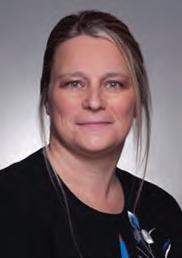
residents transition to independent living while maintaining their recovery.
The opening of this new facility underscores SUN Behavioral Delaware’s commitment to addressing the community’s behavioral health needs. The center provides flexible treatment options that accommodate patients’ daily responsibilities, allowing them to receive care while maintaining their routines.
For more information about the services offered or to schedule an appointment, individuals are encouraged to contact SUN Behavioral Delaware directly at 302-205-1282. n
Ann B. Wayne, BSN, RN is chief executive officer of SUN Behavioral Health

THE STATE OF DELAWARE
announced that it is making changes to improve health outcomes for members enrolled in both Medicaid and Medicare. Effective January 1, 2026, Delaware will require that beneficiaries of Dual Eligible Special Needs Plans be “exclusively aligned.”
Members enrolled in both Medicaid and Medicare are known in the industry as “duals.” Duals are eligible to enroll in a special Medicare Advantage (MA) plan known as a Dual Eligible Special Needs Plan (D-SNP). In addition to offering extra benefits beyond those of regular MA plans, D-SNPs better streamline the healthcare needs of dually enrolled beneficiaries.


By January 1, 2026, to operate a D-SNP in Delaware, Medicare companies must also have been awarded a Medicaid Managed Care Organization (MCO) contract by the state. In other words, to offer a D-SNP moving forward, the Medicare company must also own or share the same parent company as the Medicaid company. For example, members enrolled in a Wellcare D-SNP must also be enrolled in Delaware First Health’s Medicaid plan. (Both companies are owned by Centene.)
BY BILL WILSON



D-SNPs currently operating in the Delaware market whose company or parent company was not awarded a Medicaid MCO contract by the state— such as United, Aetna, or Cigna—will be permitted to operate during an optional one-year grace period in 2025. This will allow a smoother transition for those D-SNPs and give time for their enrollees to consider other options. Those D-SNPs will also be prohibited from enrolling new dually eligible members in 2025.
What this means is that current D-SNP beneficiaries who are enrolled in a D-SNP that is not affiliated with a Medicaid MCO must switch to an aligned plan, likely during the annual open enrollment period. People who become dually eligible in 2025 can join an aligned plan now.
This is an important initiative that will impact many Delawareans. With the Medicare and Medicaid companies aligned, information sharing increases tremendously—benefiting the enrollee, who now has better care coordination. We applaud the State of Delaware for







this change, as it will certainly improve the quality of life and health outcomes for D-SNP beneficiaries.
If you are enrolled in a D-SNP, or know someone who is, please let them know about this upcoming change. They may need to change their D-SNP during the open enrollment period, which runs from October 15 to December 7. You can also encourage them to reach out to a licensed Medicare broker or State Health Insurance Assistance Program counselor for more information.
At Delaware First Health, our mission is to improve the health of the communities we serve, one person at a time. This change by the State will help us achieve that mission. n

Bill Wilson is the plan president &
CEO
of Delaware First Health, a subsidiary of Centene.
BY KAREN MARIE JOSWICK, MHA
DELAWARE FACES a significant demographic shift, with its aging population projected to grow dramatically in the coming years. By 2025, Delaware’s population has reached over one million residents, with over 20% of the population aged 65 or older. This demographic reality presents challenges and opportunities for health care providers, businesses, and policymakers across the state.
Traditional fee-for-service health care models are increasingly ill-suited to serve this growing senior population. Value-based care (VBC) models offer a promising alternative by focusing on quality outcomes rather than service volume. As the Commonwealth Fund defines, value-based care encompasses “effectiveness, efficiency, equity, and patient-centeredness”—prioritizing evidence-based approaches that don’t waste resources, ensure equitable access, and respect patient preferences.
Delaware stands at a critical demographic crossroads that threatens the stability of its health care ecosystem. Population projections reveal a rapidly expanding senior demographic that will place unprecedented demands on a strained system. With seniors now constituting nearly one-fifth of Delaware’s population—and projected to grow substantially through 2040, particularly in Sussex County—the state faces an urgent capacity challenge.
This demographic shift creates a “perfect storm” for Delaware’s health care infrastructure. The expanding cohort of older residents with complex medical needs coincides with a contracting health care workforce pipeline. Research from the Association of American Medical Colleges paints a concerning picture: more than 40% of U.S. physicians will reach retirement age within the next decade, while the demand for specialized geriatric care continues to accelerate. Value-based care models that emphasize prevention, coordination, and targeted interventions represent Delaware’s best strategy for maximizing limited clinical resources while improving outcomes for seniors.
Value-based geriatric care requires fundamentally different success metrics than traditional care models. As health care undergoes a value-based transformation, the focus shifts to improving patient experience, enhancing
quality, and moderating costs. This approach is particularly crucial for geriatric patients, who consume disproportionate health care resources.
For Delaware seniors, meaningful metrics include:
• Functional independence measures (mobility, activities of daily living)
• Reduction in potentially inappropriate medications
• Decrease in avoidable hospitalizations
• Care coordination across multiple providers
• Quality of life assessments
Businesses benefit when employees aren’t absent caring for elderly relatives. Value-based geriatric models that emphasize care coordination and preventive services reduce this burden. For nonprofits, these models create partnership opportunities to address social determinants of health, like transportation and nutrition, that significantly impact outcomes but fall outside traditional medical care.
For policymakers concerned about health care costs, the imperative is clear. According to Delaware’s fourth annual Benchmark Trend Report released in May 20241, per capita health care spending in the state increased 6.3% in 2022 to $9,657, far outpacing the target 3% growth rate benchmark. Value-based geriatric care models offer a path to bending this cost curve while improving outcomes for a vulnerable population.
By redefining how we measure success in elder care, Delaware can create a more sustainable, effective health care system that serves seniors with dignity while controlling costs—a win for patients, providers, businesses, and taxpayers alike. n

1. Delaware Health and Social Services. DHSS Releases Fourth Annual Health Care Benchmark Trend Report.” May 7, 2024.
Karen Marie Joswick, MHA, is president and CEO at Benevolence Health
In a heartfelt tribute to a beloved wife, mother and community advocate, Charles Burton, president and owner of I.G. Burton Auto Group, has made a generous pledge to Bayhealth to name the Bayhealth Childcare Center in honor of his mother, Ann L. Burton. This contribution reflects Ann’s lifelong dedication to helping families and children.
“As a local family-run business since 1908, we wanted to honor Ann’s legacy in a way that reflects her dedication and passion for the community,” said Burton. “Behind the scenes, she brought a lot of dedication, care and guidance to those who needed it most. This is an opportunity to tell her story and honor her not just for what she did, but for who she was – proof that impact isn’t always loud but is always lasting.”

The new Bayhealth Ann L. Burton Center for Children will serve as a vital resource for team members who work at the Bayhealth Sussex Campus, offering a safe and nurturing environment for children through age 11. This new facility is in addition to the accredited and award-winning child care center at the Bayhealth Kent Campus. The Ann L. Burton Center for Children will include age-appropriate classrooms, play areas, gardens and support space for an additional 102 children.
Integrity Staffing Solutions, a leader in workforce solutions and high-volume staffing, proudly announces a strategic leadership transition designed to drive continued innovation and growth. Jaime Donnelly has been appointed chief executive officer (CEO) while also continuing her role as president.

Jaime Donnelly
Donnelly began her journey with Integrity Staffing Solutions in 2000, steadily growing through the ranks in key leadership positions across operations, compliance, sales, and HR. Her deep understanding of the business and commitment to an associate-first philosophy have shaped Integrity’s success. As CEO, she will lead
the company’s continued expansion, commitment to workforce development, and technology-driven staffing solutions.
This transition also marks a new role for Todd Bavol, who will assume the position of chairman of Integrity Staffing Solutions. In this capacity, Bavol will focus on long-term strategy, industry innovation, and talent development.
“Jaime has been instrumental in Integrity’s success, and I have full confidence in her leadership as CEO,” said Bavol. “Her dedication to our people, clients, and innovation will drive our company into the future. As chairman, I look forward to supporting our leadership team and ensuring we remain ahead of industry shifts and workforce trends.”
Nemours Children’s Health, one of the nation’s largest multistate pediatric health
systems, announced the appointment of Caswell L. Samms III, MBA, as the new executive vice president and chief financial officer (CFO).
As CFO, Samms will lead financial strategy, ensuring Nemours Children’s maintains its financial strength and stability as the organization continues its commitment to delivering the highest quality care and addressing all of the factors that impact child health. He succeeds Rodney McKendree, who retired as CFO in February.
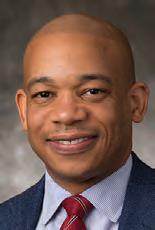
Samms brings more than 25 years of progressive experience in large health care systems. Most recently, he served as senior vice president and chief financial officer at St. Joseph’s Health in Paterson, N.J. His executive experience includes budgeting, revenue cycle,
business development, and operations.
“Caswell’s leadership will help keep our financial foundation strong, enabling us to achieve our vision of creating the healthiest generations of children,” said R. Lawrence Moss, MD, FACS, FAAP, president and CEO of Nemours Children’s Health. “Caswell is authentic and caring, and he shares our commitment to helping children reach their full potential.”
Goldey-Beacom College (GBC) has recently received a grant for $19,500 from the Eagles Autism Foundation for a Sensory Inclusive™ Certification and Sensory Room Enhancement at the College.
This space is designed for students who experience sensory sensitivities or simply need a quiet, calming place to recharge. This initiative reinforces GBC’s commitment to student well-being, ensuring every student feels supported and has access to the resources they need to succeed. The College has partnered with KultureCity® for both projects.
The $19,500 grant awarded to GBC is part of $8.1 million in funding awarded by the Eagles Autism Foundation in 2025 to support 53 innovative projects focused on advancing autism research and care. These grants were made possible through the generous contributions raised during the 2024 Eagles Autism Challenge, along with additional fundraising efforts led by the foundation throughout the year.
GOLO, the Delaware-based health and wellness solutions company, and Project Fit America (PFA), a national nonprofit that creates and administers fitness-ineducation programming for elementary
and middle schools, announced that Joseph M. McVey Elementary School in Newark, Del., has been selected to receive a grant to support its physical education curriculum. GOLO has committed $10,000 to support the fitness program designed by Project Fit America, which is also intended to help children build social, character, and leadership skills.
“We are thrilled to partner with Project Fit America to introduce this exceptional physical education program to Joseph
M. McVey Elementary School. This initiative promises to enrich the lives of both teachers and students, fostering a healthier and more active school community,” said Jennifer Brooks, president and co-founder of GOLO.
Joseph M. McVey Elementary School was selected for the grant by Project Fit America after conducting an open call for proposals with all public schools in Delaware, including those in Kent, Sussex, and New Castle counties.

Wilmington-based developer Buccini Pollin Group Inc. proudly announces the grand opening of Market West, a dynamic mixed-use development that reimagines the former DuPont headquarters in downtown Wilmington. As the flagship building at Market West, the $110 million redevelopment of 221 W. Tenth St. (formerly Nemours) centered around a 450,000-square-foot office-to-residential conversion to introduce 363 luxury apartment homes at The Standard. The grand opening celebrates the building’s return to a thriving mixed-use destination with the completion of phases one and two of The Standard, marking a major milestone in the company’s long-term vision for the revitalization of downtown Wilmington.
Aptly named, The Standard at Market West sets the new standard for apartment living in Wilmington. Designed by 39° North Architects, The Standard blends the building’s historic architecture with contemporary living. The phased development includes 92 units completed in summer 2023 from the former LuxiaSuites corporate housing, 174 units completed in early 2025, and 97 units currently in development with expected completion by late 2026.
Offering studio-to-three-bedroom floor plans, the apartments feature highend finishes, including continuous quartz countertops, herringbone tile bathroom flooring, and two-tone kitchen cabinetry. Residents benefit from onsite amenities such as The Mill coworking space, Theater N, CoreTen Fitness, Starbucks, Café Mezzanotte, and exclusive community areas, including a roof deck, pet-washing station, and multiple resident lounges.
Did you miss the Chamber Chatter online? Here are some posts about us on social media...


@Delaware State Chamber of Commerce
@DelawareStateChamber


@DEStateChamber
Agilent Technologies: �� We are delighted our Resolve Handheld Raman has been voted WINNER of the 2025 Coolest Thing Made in Delaware contest! ��
Our thanks go to the people of Delaware who voted for our product and the Delaware State Chamber of Commerce and the Delaware Manufacturing Association for their fantastic support of the manufacturing industry in the state.
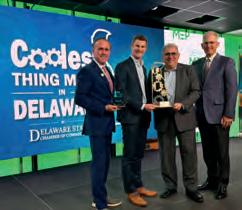

#Agilent #CoolestThingDE #MFGConf #molecularspectroscopy
Robert Walls: I am deeply grateful to have attended the 2025 State of the Guard Address in conjunction with the Delaware State Chamber of Commerce & New Castle County Chamber of Commerce. It was a privilege to hear from our esteemed elected officials, including Governor Matthew Meyer, LT Governor Kyle Evans Gay, Congresswoman Sarah McBride & Brigadier General Michael J. Karwatka. The event, hosted at the Major “Beau” Biden National Guard Reserve Center in New Castle, DE, was truly inspiring.
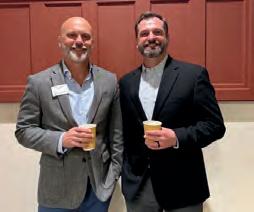



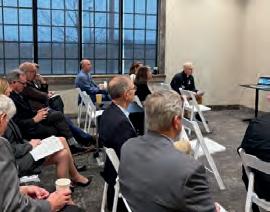
GGA Construction: THANK YOU, Delaware State Chamber of Commerce for hosting your Board of Governors meeting at our office this week!
It was a pleasure to connect with so many leaders who are deeply committed to making Delaware the best place to live and do business. Looking forward to continuing to work together to support and strengthen our community.

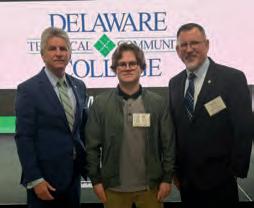

DrMarkBrainard: Great event today at the annual Spring Manufacturing & Policy Conference hosted by @DEStateChamber with keynote remarks from the Governor @MattMeyerDE and the presentation of the Coolest Thing Made in Delaware. This year’s winner? @AgilentTechnologies and on the Agilent team is Grant Bucy, manufacturing technician and DTCC grad! #dtccpride
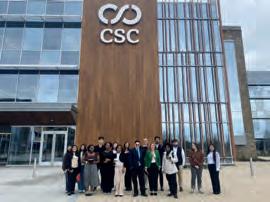
Elisabeth Parker: There are 500,000 jobs in Delaware!
Rohrer College of Business at Rowan University students spent the day learning about internships and early career opportunities around Wilmington, only a 45 minute drive from Rowan University.
�� CSC

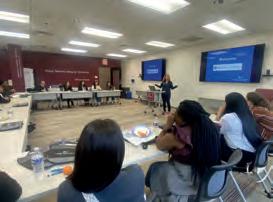


�� M&T Bank + Wilmington Trust �� Belfint, Lyons & Shuman, P.A.
Huge thank you to: Helana Rodriguez & Amanda Schimmel for coordinating this trip through the Delaware State Chamber of Commerce.

MAY 15, 2025
13th Annual DYPN Golf Outing
The Delaware Young Professionals Network will tee off for an afternoon of golfing and networking at White Clay Creek Country Club. Foursomes will include three young professionals and one mentor.
Young Professionals / Members: $65 Future Members: $75

MAY 15, 2025
Join the conversation at Small Business Day in Dover! This event offers an unique opportunity to stay informed about regulatory and policy issues affecting your business and engage directly with the policymakers who can shape these policies. Meet us at Legislative Hall to take an active role in discussions that shape the future of Delaware.
FREE to attend

MAY 21, 2025
Small Business Day in Dover web.
When you think of the Delaware State Chamber, think of
Fill up your calendar by visiting our events page online at
It’s been an eventful year for the 153rd General Assembly, who saw a new governor and lieutenant governor, leadership changes in the house, and welcomed 8 new members. The End-of-Session Policy Conference will highlight key bills before the General Assembly and feature a legislative wrap-up from House and Senate leadership.
Members: $75 Future Members: $95
.com/atlas/calendar
*Additional events will be added as they are scheduled. Visit the State Chamber’s event calendar online for the most accurate and up-to-date calendar.
The State Chamber of Commerce staff works for you, serving our member companies and organizations statewide. This State Chamber staff directory lists phone numbers and email addresses, as well as individual areas of responsibility. If you need business assistance or information, please don’t hesitate to call.
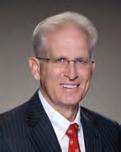
Michael J. Quaranta President (302) 576-6585 mquaranta@dscc.com

Melissa Brayman Director, Administration & Finance (302) 576-6572 mbrayman@dscc.com

Damon Howard Manager, Digital & Print Advertising (302) 576-6579 dhoward@dscc.com

Amanda Schimmel Manager, Marketing & Accounting (302) 576-6560 aschimmel@dscc.com

Kelly Basile Chief Operating Officer (302) 576-6564 kbasile@dscc.com

Regina Donato Director, Communications (302) 576-6567 rdonato@dscc.com

Danielle Blake Vice President, Member Engagement (302) 576-6571 dblake@dscc.com


Tyler Micik Director, Public Policy & Government Relations (302) 576-6590 tmicik@dscc.com

1201 N. Orange Street, P.O. Box 671 Wilmington, DE 19899-0671 (302) 655-7221 www.dscc.com
Kerri Welcher Manager, Events (302) 576-6566 kwelcher@dscc.com

Ken Evans Account Executive (302) 576-6576 kevans@dscc.com
Helana Rodriguez Director, The Partnership, Inc. (302) 576-6575 hrodriguez@dscc.com
Facebook: DelawareStateChamber
Twitter: DEStateChamber
Linkedin: Delaware State Chamber of Commerce
YouTube: DEStateChamber
Instagram: DEStateChamber





CONNEXMarketplaceisanonlinemanufacturingplatformthatconnectsallU.S. manufacturers&suppliersintoasingle,accurate,searchablesupply-chainsolution!It'snot justanotherbrokerplatformbutarevolutionarynewwayforU.S.manufacturers&suppliers tofind,befound,connectandcontractdirectlywitheachother.



QuicklyfindtheperfectqualifiedU.S.supplier
Manufacturing-onlydata(noserviceproviders!)
PostRFPs/RFQs/RFIs&sendtomatching suppliers
ViewallU.S.supplierdatainonelocation
Filtersuppliersby:location,certifications,SBAdesignations,materials,equipment,processes& more
Blacklistedsupplieralerts
Supplychainriskvisualization
Communicatewithpotentialsuppliersdirectlyin platform

Findidealcontractswithlesseffort!
ReceiveRFPs/RFQs/RFIsdirectlyfrombuyers(no brokerlistings!)
Findalternatesourcingforparts&materials Discovernewcontractopportunitieswithinnew industries
Showcaseallofyourcapabilities,certifications, SBA-designations,equipmentandmoreinone locationforbuyerstosee
ConnectandresponddirectlywithOEM/Prime buyerswithinplatform
Yourdataisneversoldorshared!






Bayhealth Kent General Hospital (19114)


Because cancer is like no other diagnosis in the way it can create fear and overwhelm every part of your life, our approach to cancer care is like no other. It starts with an ongoing investment in knowledge and resources that allows us to deliver quality medicine with precision and excellence. And includes large doses of compassion from some of the brightest minds and caring hearts in medicine.
